#this book is FEEDING ME in unexpected character interactions
Explore tagged Tumblr posts
Text

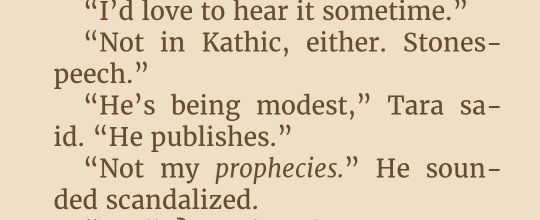
oh im loving this trio
#this book is FEEDING ME in unexpected character interactions#temoc and mal being very bitter ex enemies and current (technically) in-laws?? hilarious#ms kevarian being caleb's auntie elayne???? heartwarming#abelard and caleb's whatever the fuck that was?????? 👀#and of course. tara and kai making googly eyes at each other while shale is suffering. peak ot3 material#craft sequence
4 notes
·
View notes
Text

Rating: 3/5
Book Blurb:
An Indie Next pick! A gorgeous hardcover edition featuring lavender sprayed edges! The Spellshop is Sarah Beth Durst’s romantasy debut–a lush cottagecore tale full of stolen spellbooks, unexpected friendships, sweet jams, and even sweeter love.
Kiela has always had trouble dealing with people. Thankfully, as a librarian at the Great Library of Alyssium, she and her assistant, Caz—a magically sentient spider plant—have spent the last decade sequestered among the empire’s most precious spellbooks, preserving their magic for the city’s elite.
When a revolution begins and the library goes up in flames, she and Caz flee with all the spellbooks they can carry and head to a remote island Kiela never thought she’d see again: her childhood home. Taking refuge there, Kiela discovers, much to her dismay, a nosy—and very handsome—neighbor who can’t take a hint and keeps showing up day after day to make sure she’s fed and to help fix up her new home.
In need of income, Kiela identifies something that even the bakery in town doesn’t have: jam. With the help of an old recipe book her parents left her and a bit of illegal magic, her cottage garden is soon covered in ripe berries.
But magic can do more than make life a little sweeter, so Kiela risks the consequences of using unsanctioned spells and opens the island’s first-ever and much needed secret spellshop.
Like a Hallmark rom-com full of mythical creatures and fueled by cinnamon rolls and magic, The Spellshop will heal your heart and feed your soul.
Review:
A librarian on the run returns to her childhood home and begins a new life filled with new friendships, cottagecore fun, and a sweet neighbor who she's falling for. Kiela is an introvert, she's never liked dealing with people and has been content to work alone with just her talking plant assistant... but when her job as a librarian is jeopardized and she is forced to go on the run, where better to hide than her old childhood home. Kiela takes the books that she can and returns to her home to start a new... but that means being forced to talk to her neighbors, make friends with the townsfolk, and actually having to try and socialize as well as set up a shop and fix her old home. While using unsanctioned spells is illegal and could spell out trouble for her, Kiela can't help but want to make things better and use some magic. The more time she begins to spend making friends and socializing the more she is beginning to realize that she doesn't want to be alone anymore and that sometimes a little magic can go a long way. This definitely was a cozy fantasy that would be perfect for fans of Stardew Valley and Animal Crossing. Its a slow day to day kind of vibe where you get to see the character make their home, interact with villagers, and work. Theres a bit of romance but not a lot, and if you like slow cozy fantasies such as Legends and Lattes then I think this would be perfect for you!
Release Date: July 9,2024
Publication/Blog: Ash and Books (ash-and-books.tumblr.com)
*Thanks Netgalley and Tor Publishing Group | Bramble for sending me an arc in exchange for an honest review*
3 notes
·
View notes
Text
Well, Sense and Sensibility won my poll a handful of weeks ago, but as I only got around to finishing Song Of Achilles last week, I only began reading S&S today….
Unfortunately, as much as I want to enjoy it, as thoroughly as I enjoyed Pride and Prejudice, reading just the first few chapters earlier gave me a headache. It’s much too wordy for my little ADHD Zoomer brain to fully digest and comprehend right now, and as I want to fully enjoy the books I read, I have decided to put it back on the shelf for now, and revisit it at a later date, when I feel more up to the challenge of understanding the older language used.
Now, I could just choose the next highest book voted for in the poll, but where’s the fun in that? Instead I have shrunk the contestant size, chosen the top 5 books I am most considering, and only leaving the poll active for only 24 hours!
To make things more fair and to allow anyone who might not know my choices well to vote too, I will include a very quick summary of the blurbs on the back for context!
FEED: Main character, Titus, and his friends live on the Moon in a futuristic environment. They are used to a constant stream of online activity sent directly into their brains, called their ‘feed’, until a hacker causes them to malfunction and they are left with nothing but their own thoughts for what is presumably the first time ever.
Like A Love Story: Setting is 1989, New York City. Main character is a teenage boy named Reza. Reza is a gay, closeted, Iranian immigrant who is afraid for people to find out he’s gay as all he knows about the ‘lifestyle’ are the media’s images of men dying from AIDS. A girl he dates, Judy, has an uncle with AIDS who devotes his time to activism with ACT UP. Judy is also best friends with the only out-and-proud guy at their school, Art, who is rebelling against his conservative family by photographing and documenting the AIDS crisis.
Fairy Tale: Main character Charlie is seventeen and meets an old recluse, Mr.Bowditch, who he starts doing jobs for. When the old man dies, he leaves a cassette tape for Charlie, telling the story of the secret he’s been keeping all his life; he has a portal to another world in his shed, and Charlie just inherited it.
Companion Piece: A woman receives an unexpected call from a former classmate/college friend asking for help deciphering a puzzling interaction. Everything is somehow linked to the life of a young blacksmith hounded from her trade and branded a vagrant nearly 500 years ago.
1984: Set in Oceania, a society is being tyrannized. In the furtherance of eradicating all expressions of individuality, people’s lives are constantly monitored via telescreens, helicopter patrols, window-spying and the Thought Police. Main Character Winston Smith sits in the one corner of his apartment that is hidden to write a diary, despite the threat of severe punishment.
3 notes
·
View notes
Text

for some reason, i became obsessed with this irrelevant filler character from izumi tsubaki’s lesser known series, oresama teacher. he’s consistently forgotten by fans and ranked 2nd to last out of the student council members, but despite that, i still think he’s a great and well-written character. also, he’s super cute!
and so without futher ado— here’s my stupidly long lovemail/analysis of shuntaro kosaka. a pure 1.5k word ramble about my favorite boy!
kosaka first appears in chapter #43, introduced alongside the rest of the student council members. he’s in class 1-3, the same as yukioka komari. the first major scene we see him in is him having a bad relationship with fellow council member, kanon nonoguchi.
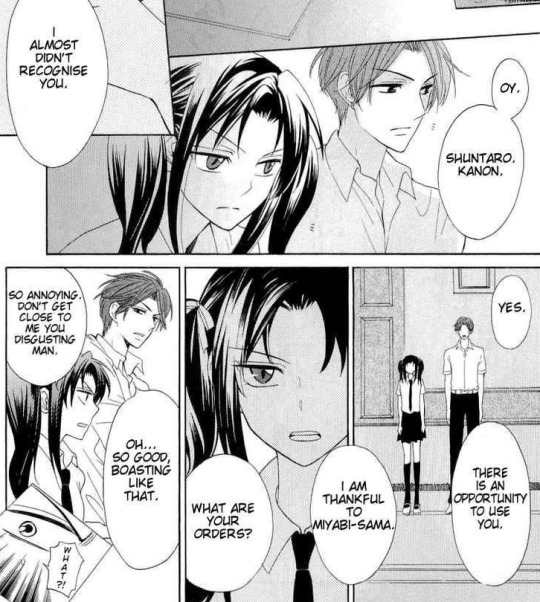
not gonna lie, i forgot this scene existed and i don’t like it since he touches her forcefully. it’s a setup for their relationship later on, though. at this point, kosaka and nonoguchi are both closed off and cold towards each other; aside from their animosity towards each other from their interactions, they have their own personal issues for not being good with interacting with others. nonoguchi has her problems with men stemming from childhood and kosaka just seems bad at understanding how to act properly with people in general.
kosaka’s main arc is the student festival arc, where he plays the villain, but honestly, he’s just cringy as fuck in it. i think it’s good in that it shows how damn extra he is, though-- imo, he’s the most realistically extra of the characters. he’s a 15 year old kid who thinks he’s smart just ‘cause he gets good test scores. of course he’s going to be that bitch who smiles sneakily and thinks of himself as the grandmaster of the chess game, even when his partner in crime, kawauchi, knew all along of his betrayal plan.
we don’t see much of his motivations or personality in the student festival arc as it focuses mainly on okegawa and kawauchi. all we know so far is that he’s smart, manipulative, and sneaky. seems like a typical bad guy.
until the last chapter of the arc, #51. for the first time, we see the previously cool (lol) and cunning kosaka shuntaro... nervously fretting over how to kneel in apology to his superior, miyabi hanabusa.
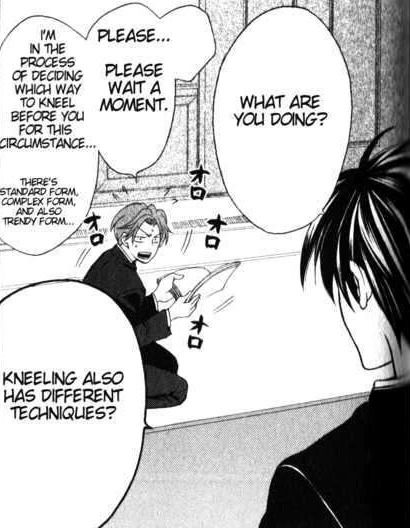
we learn that kosaka is obsessively reliant on instruction manuals, ever since his childhood. he’s ridiculously good at studying and always gets first place in tests at school. however, he can’t cope with unexpected changes at all. everything has to go exactly to plan or else he comes up with a different approach to completing the original plan, that isn’t always appropriate for the situation.
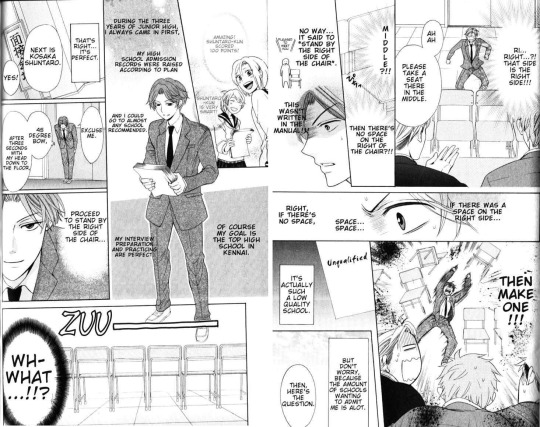
he’s perfectly confident in interacting with people-- that’s obvious enough throughout the student festival arc--, but he’s bad at interpreting things on the fly, once again, prone to saying things inappropriate to the time and place. kosaka has to do things in order, step-by-step, otherwise he can’t proceed.
a while back, there was a post that talked about him being autistic. to be honest, i never considered this earlier (as in a few years ago, when i first started liking him a lot). but reading back, he really is strongly coded as such, i think. so frankly, the reason i like him might be a more personal reason, but... anyway.
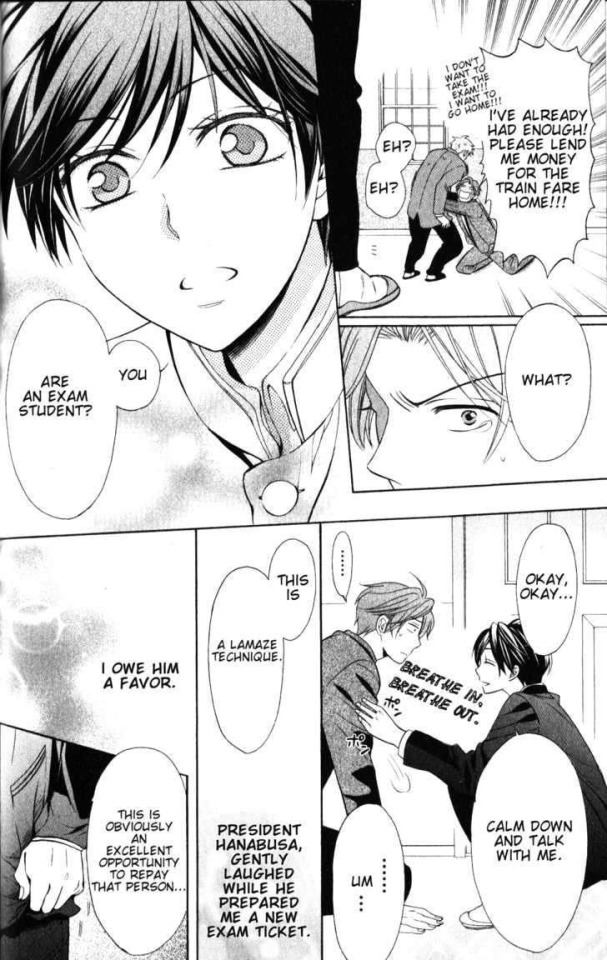
like with the other student council members, miyabi helps him relax and feel better, guiding him to be more carefree and open. i have mentioned this a few times, but i think it’s really wonderful that miyabi basically helped out a bunch of kids with mental issues when their problems might’ve looked small or stupid from the outside. this is also brought up in chapter #104 during the hayasaka arc, where mafuyu and hayasaka both contact him for information about miyabi. he basically says that miyabi got him to join the student council because he was worried about kosaka’s personality and wanted to stay near him for help.
honestly, kosaka is probably the one who’s most grateful to miyabi (outside of nonoguchi?) simply because he recognizes his own issues. there’s a reason why he’s the only student council member whose face you can’t see during the scene where miyabi graduates; he’s the only one of the guys who cry.
kosaka’s problem is that he can’t cope with his plans going off at all, so miyabi sends him to prank mafuyu. even though he tries to get her by making many elaborate plans, he eventually learns to just attack without plan. it ends with him stuck in a ditch and miyabi unexpectedly pranking kosaka himself.
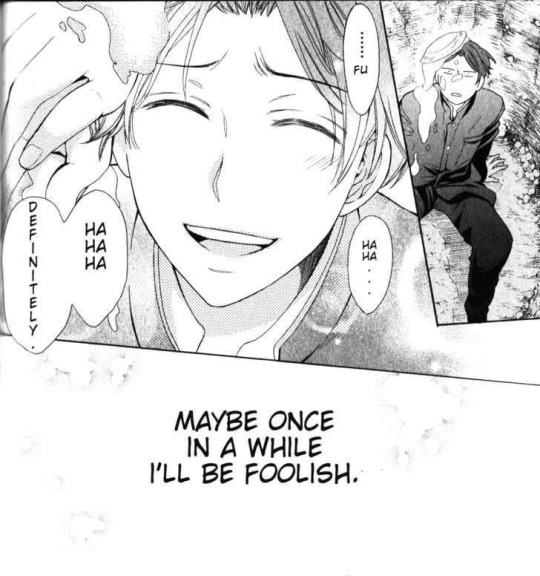
here we see kosaka’s first genuine smile. and it’s beautiful!!! he’s a sweetheart!!! i think that the story of kosaka could’ve worked even without the student festival arc, but that establishes him as an dramatic kid who’s super smart and cunning-- and here we see him just relax for once, and be truly happy.
after this, there aren’t any more kosaka focused chapters. however, he does appear once in a while, usually with the other student council members. (he’s in the very next chapter using yui’s equipment to cross the lake. but since he usually feeds the fish, they all come to him for food...)
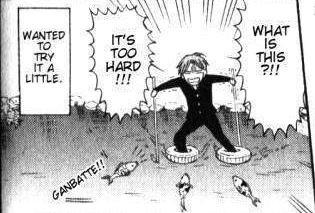
kosaka's bad relationship with nonoguchi is reiterated in nonoguchi's arc, chapter #71 where she beats him up for saying that all girls want a prince. it's a stereotypical thing to say either way, but nonoguchi's response about "men wanting to be princelike is self-serving" is more due to her own issues rather than about kosaka in particular. anyway, this is just to highlight that at this point, they both still have their own problems and don't get along.
the next time we see him is during the school trip arc, where, although he’s still being far too overprepared by carrying too much luggage, he seems to be getting along with his class very well. kosaka organizes his class’s schedule and accommodates for changes on the fly (when his teacher wanted to stay longer to see the sea otters), even if it annoys him a bit. it’s an improvement! he’s able to assume a role where his pedantically organized personality is a benefit. mafuyu also notes that both he and ayabe have become more carefree and open with others, with kosaka becoming “the center of class 4″.
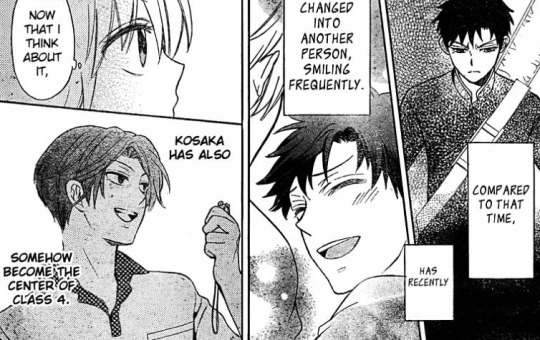
i think this chapter, #82, is also the first time kosaka talks about yukioka. since yukioka doesn’t talk to anyone aside from miyabi, he had never heard her voice despite being a close friend. there’s not really any significance to them being besties (does there need to be?), but it does show his sense of responsibility for others since he basically takes care of her. he has more scenes with yukioka in various arcs, mostly in the miyabi graduation arc where he helps protect yukioka from aki.
speaking of that arc, like the other student council members, he gets something precious to him stolen. in this case, it’s the books that he always reads. we find out that he’s actually surprisingly good at drawing from memory despite him believing he doesn’t know how to draw without instructions. this may be partially may be some juxtaposition of him truly being ‘creative’ even though his methods are so ‘academic/scientific’ (even though i don’t believe ‘drawing well’ is what ‘creativity’ is). in my opinion, this represents his progress in general. it’s probably not just art/drawing, but he’s actually gotten better at doing most things without manuals without realizing or being aware of it.
this idea is also expanded upon with the protection of yukioka i mentioned earlier. because kosaka doesn’t have his books, he doesn’t act so formal and is instead more forceful and ‘manly’, making it easier for him to communicate with classmates. by the way, kosaka’s actually popular with the girls in his class (shown in school trip arc 1-koma), but doesn’t realize it because he can’t understand things not directly stated. what a guy...
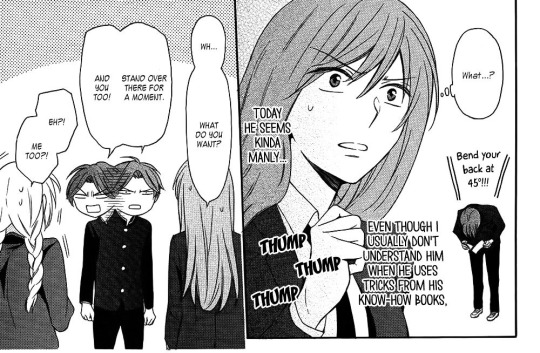
here is a short break to talk about kawauchi. i think their relationship is hilarious. from kawauchi getting him to dig holes to kawauchi stealing his math books... i feel really sorry for kosaka, but it’s so funny... he just can’t escape him. even in the very last student council saga arc, it was kawauchi behind the scenes all along...
really they’re two characters who are heavily associated with each other and yet... i don’t think kawauchi’s relationship with kosaka says anything about his personality since kosaka was such a one-bit character during the majority of the arc where they interacted (plus kawauchi is awful to everyone). all kawauchi did was give kosaka more trust issues and broke his phone. i feel kinda mean for saying this but it’s so funny how he caused kosaka to be absolutely terrified of delinquents.

honestly kosaka like... doesn’t have a reason to be associated with kawauchi beyond the student festival event. imo it’s just a way for tsubaki to make kosaka relevant or appear once in a while since the other character he’s associated with (yukioka) got a boyfriend and doesn’t appear as often (kawauchi’s common appearances is due to his surprising popularity with fans).
enough about kawauchi though, we’re finally at the end of this long and loving post. at the conclusion of the miyabi graduation arc, the very first conflict of kosaka shown is finally resolved: he’s made up with nonoguchi!
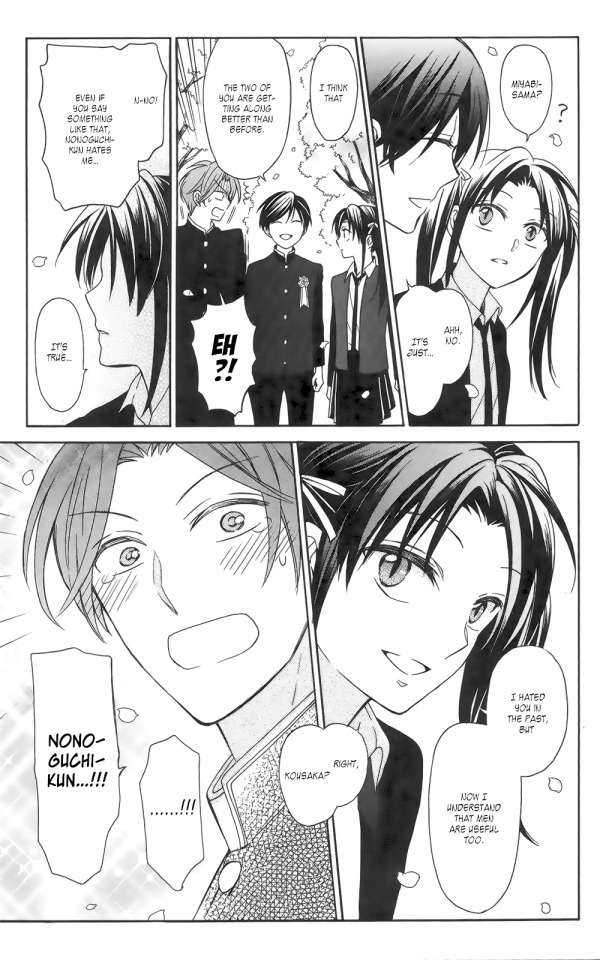
i really love this scene so much!!! i know it’s kinda just a set-up for the next joke, but tsubaki still dedicated over a page just to nonoguchi and kosaka, so it’s genuine to me! it’s so lovely to see that nonoguchi and kosaka have both resolved their own issues with the help of miyabi and the public morals club. they both acknowledge that they weren’t the best in the past, but now they can become friends... this is a relationship that’s been developing in the background of oresama teacher for over 80 chapters... it makes me so happy that tsubaki gave a resolution to it in the end. she truly does care about all her characters no matter how unpopular they are, and i love her for that.
(by the way, i just found out that this can badge released in the same year as the miyabi graduation arc. they’re so cute!)
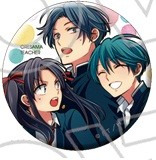
the story of kosaka and the student council as a whole ends here. everyone’s finally improved, and they’re all happy... people say “oresama teacher has no plot”, but there’s so much to the story of the student council. if i can write so much about one minor character who rarely appears, i think there’s plenty of plot and plenty to say about the others.
that’s all i have to say on this topic for now.
actually, i started writing this back in 2019 but i forgot about it until recently. my thoughts haven’t changed, though... i hope this post shines some light on why i like kosaka and tsubaki so much. to be honest, though, i’d probably just say that he’s sooo cute and i wanna protect that sweet smile of his... my 174 cm tall son.
#oresama teacher#shuntaro kosaka#text#please read it i simply think izumi tsubaki is a genius#i'm ignoring everything past miyabi graduation arc btw i forgot what happened there so </3
34 notes
·
View notes
Text
Episode 4 (& Wangxian Meta)
Previous Episode | Next Episode
(Spoilers for the whole show ahead!)
Cultivation Partner

Episode 4 opens with shots of the Lan clan’s rule books that drowned Wei Ying the night before. As explained in this amazing observation by a fan, the only rule that is visible in the shot is the one which states a Lan clan member should not take off their forehead ribbon unless in front of their parents or cultivation partner, despite the show using the word “wife”. This is a strikingly gender neutral change for a show that is going above and beyond to establish that the heroes are in love without being allowed to do so explicitly.
Wei Ying is Whipped, Lan Zhan is An Ice Prince

Wei Ying is like a puppy in constant need of love and affection from Lan Zhan, isn't he? It is so important to him that Lan Zhan forgive him, befriend him, laugh with him, spend time with him. Oh Lan Zhan, if only you would look past who you are supposed To Be and admit how cute he is.

There are only two people who can make Wei Ying wear this "guilty 5-year-old who stole the candy he wasn't supposed to touch" expression, and that's Lan Zhan and his Shijie.
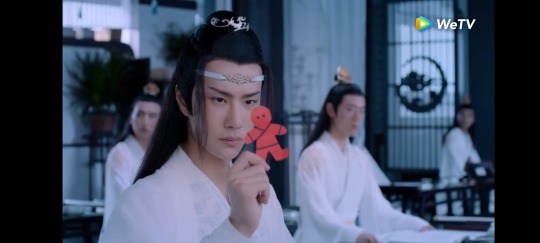
Wei Ying earned my respect with the number of times he tried to get the attention of his crush in the initial episodes. A true inspiration!

Look how excited he is to see Lan Zhan! And look how gorgeously framed they are to once again remind us they are soulmates in life and the battlefield.
Lan Qiren and Wei Ying’s Disagreement Is The First Seed of his Downfall

Wei Ying angers Lan Qiren in this scene by suggesting they harness resentful energy the same way they use spiritual energy to his hypothetical question, when such a thing is unheard of, unnatural and contemptible in the cultivation world. He gets kicked out of the lecture for his answer, foreshadowing his fall from grace.

The interactions between Wei Ying and Lan Qiren are always strained, and understandably so. He is no stranger to the grim consequences of demonic cultivation after having raised two kids who were caught in its crossfire. Lan Qiren follows the traditions he values above all else down to a T. Wei Ying's method, be it now or when he actually starts practising demonic cultivation, is something that strikes him as being almost perverse. But are him and the other cultivators right in classifying Wei Ying as corrupt for going down that road? Wei Ying simply considered a logical but forbidden path people have not dared to think about. His ideas are out of the box and definitely not the orthodox thing to do but should he be labelled a villain for it? The cultivation world and Wei Ying just have two vastly different approaches to the same problem. The line of thought separating a genius and megalomaniac is pretty thin after all, and Wei Ying's heart has never been guided by anything but pure intentions and an unwillingness to sit back in the face of injustice.
But Lan Qiren's generation and all of the cultivation world would not understand that. And what they do not understand, they fear. The order of their world is sustained only by the stratification of black and white. This is indisputable and there is no other variable to it. Heck, it even takes Lan Zhan a long time to accept it is Wei Ying who is right and the rest of the world that is wrong.
Lan Qiren represents the ancient "natural" order of the world and Wei Ying's disrespect for what reveals itself to be a suffocating system leads to the new, better, inclusive order with revised perceptions of right and wrong that Wangxian end up creating. Even if this new world comes with a great cost. The story leaves us with the questions, who is right and who is wrong, after all? Who are we to dictate that and set them in stone?
(On a less serious note, I don't know if it's because I've seen this trope in many Asian dramas, but I found it funny how Lan Qiren is questioning Wei Ying simply for the purpose of belittling him by finding a blind spot in his intelligence. Even though Wei Ying is easily the smartest guy in the room, whose heart of gold and morally grey choices paint him as a villain. It gave me "mother-in-law who despises the woman who's going to marry into their family" vibes. Lol!)
Is The Untamed A Tale of Righteousness Or A Queer Romance? Both, Always Both

Somewhere in this war that will happen between Wei Ying and the rest of the cultivation world, between what can be considered right and wrong, honor and disgrace, the natural and unnatural ways of life (which are all codified into an absolute, immovable binary), there is a metaphor for being different in a world that is hell bent on excluding you for being thus. And you know what Wei Ying’s whole journey reminds me of? Of our heroes being queer. If you haven’t thought about it, the parallels do exist in the story, becoming obvious when Lan Qiren punishes Lan Zhan for questioning the fallacy in the same rules that made him lose his lover, and culminating with Lan Zhan irrevocably taking Wei Ying’s side in episode 42. He chooses to be on the “wrong” side with Wei Ying, orthodoxy be damned. (I’d hate to be Lan Zhan's uncle who is implied to be homophobic and ends up having a son-in-law.)
It might be early in the story to bring this up but The Untamed is at its crux, a story about two different guys who come together for the same cause and fall in love on the path of justice, while struggling to safeguard the definition of morality they know in their hearts to be true. Their soulmateship is woven inextricably with living with a clean conscience and doing the right thing even when the world tells them they are grossly incorrect. (Eat that, Romeo’s and Juliet’s! What life-or-death challenges did straight romance ever face?) That’s how Wangxian’s upright lifestyle (which only they know to be just and others frown down upon) doubles as a metaphor for their relationship. Some people support it, some don’t, some even deplore and oppose them for it because they think they are committing a crime. Doesn’t change the fact that we, the audience, can see that they are right (and that they’re in love). In fact, it is precisely because they chose the single log bridge together (because they fell in love) that led to balance being restored in their morally corrupt world.
It’s the many little things like this about our two heroes that make the world of The Untamed undergo a transformation for the better. We don’t talk enough about the fact that Wangxian together overthrow ancient, draconian laws that decreed what is black and white, by swearing an oath to protect the powerless together but also by swearing an unspoken vow to be together forever. And one can hope, especially if you’re a queer person who fell in love with this story, that the world and most of Asia will see the light about the LGBTQ+ people one day, like the other characters realized Wei Wuxian and Lan Wangji were not criminals but the best of human beings who simply lived life the only way they knew as being honest with themselves and true to their hearts. They need not spend their lives on the lonely bridge of darkness, and deserve a wider path of acceptance built by and shared with the rest of the world, one that shines under the broad daylight, because they have always, always been in the right. Like Lan Zhan and Wei Ying have been. It’s that everyone else is slow to catch up with them.
It Is Doubly Hard For Lan Zhan To Do The Right Thing
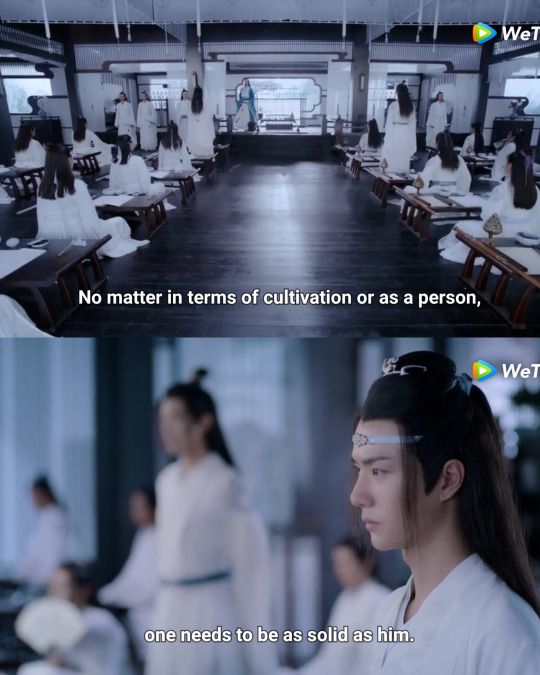
Lan Zhan in this scene recites the rules he has learnt verbatim and his uncle beams. It is clear he takes pride in Wangji being his prized student and the perfect example of who a duty-bound clan member should be. The person Lan Zhan used to be makes it that much harder for him to rebel against his own uncle later. I cannot imagine the courage it took him to unlearn the principles he had centered his life around after they turned regressive, and acknowledge that they did more harm than good by viewing an expanding universe through an achingly narrow vision.
Wei Ying was born free-spirited and defiant so his choices are not totally unexpected. But Lan Zhan's choices make him lose his reputation as the unwavering bearer of light, along with the respect of his uncle who had placed him on a pedestal and vice versa. Once again drawing the comparison that turning his back on the world and ensuring his conscience was clean is the same as siding with Wei Ying, the man who he loves and was wrongfully denounced by everyone.
In summary, Episode 4 shows us the polarity between our heroes and the lives they lead. And after all, it is the most basic rule in the book that opposites make the perfect formula for a romance.
What Gay Messages Is The Show Sending?
In the new world order Wangxian write by themselves when no one else can, for Lan Zhan to choose Wei Ying means to choose an honorable life, and to choose Wei Ying also means to choose love. Their love for each other is the last standing untarnished virtue in the contaminated world that is already unravelling when Lan Zhan declares his love for Wei Ying in public and the first virtue in this new world that came into existence all the way back when Lan Zhan and Wei Ying launched the lantern together, deciding to stick together and be the voice that speaks out for the voiceless. It is Lan Zhan and Wei Ying’s love for each other that redeems the sorrows of the past, and paves the way for a greener future in their world. Their love story is undoubtedly the most extraordinary part of The Untamed and we are privileged to have seen it in our lifetime.
It is groundbreaking, if this metaphor for their gay love story was at all intended in any way. Even if it wasn’t, Wangxian are the queer heroes that have been sorely missing from our history. Their story propagates that people like Wangxian are liberated only when we realize we have to foster and feed the very thing that makes us different. The odds are we are the only ones capable of knowing that we are right, even if everyone else condemns and invalidates something as vital as our existence. For the sake of our clean conscience, we go on living life the way we see fit because that’s what living an honest and honorable life entails. That’s what Lan Zhan and Wei Ying would want us to do. We are all ridiculously ahead of a time that is running to keep up with us. So..

#the untamed#chen qing ling#cql#mdzs#mo dao zu shi#the untamed analysis#the untamed meta#wangxian analysis#wangxian meta#wangxian#cql episodes#the untamed episodes#the untamed rewatch#cql rewatch#lan zhan#lan wangji#wei ying#wei wuxian#cql meta#mdzs meta#cql spoilers#the untamed spoilers#lgbtq#queer romance
127 notes
·
View notes
Text
My thoughts on... Scripting Your Destiny
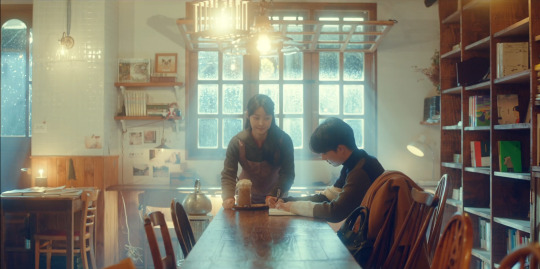
Release date: March 16, 2021
Episodes: 10
Available on: Viki
Summary: Every human is born with a book that records each moment of their life and that we call destiny. Shin Ho Yoon is one of the many deities in charge of writing those books, known among the gods for his meticulous approach to his work. For his latest project, the destiny of the mortal Jeong Ba Reum, he intends to write a masterpiece, a perfect destiny, pairing him with his first love, Go Che Gyeong, a scriptwriter for successful, if over-the-top, makjangs like Marriage Pact and Sky Cash. However, when Che Gyeong doesn't fall for the fateful encounter that he wrote, he decides to take matters into his own hands and bluntly approaches her to find out how to get her to fall in love. As the two begin to develop feelings for each other, the perfect destiny envisioned for Ba Reum threatens to disappear and a new destiny between a god and a mortal begins to emerge. But can a god of destiny write his own fate?
Rewatch meter: Medium
WARNING: Spoilers beyond this point.
Characters
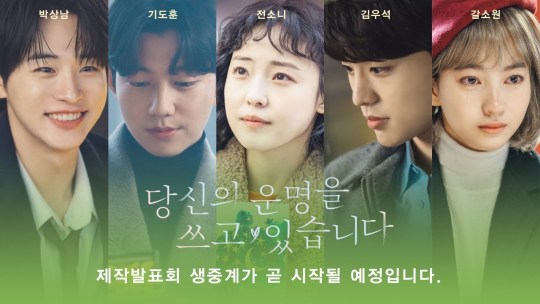
From left to right: Park Sang Nam as Shin Myeong; Ki Do Hoon as Shin Ho Yoon; Jeon So Nee as Go Che Gyeong; Kim Woo Seok as Jeong Ba Reum; and Gal So Won as Samshin.
Overall, I liked the leads and most of the supporting characters. As far as the leads are concerned, I think Ki Do Hoon was able to deliver a good performance of what a god of destiny might, or perhaps should, be like: standoffish, emotionless, uninterested in the mortal realm beyond the scope of his duties. As such, Shin Ho Yoon feels the more godly of the different deities in the show, what is curious considering he's probably one of the youngest gods of destiny, what is explained through his cycle of rebirth. I wish the writer and the actor had made full use of this cycle by having the character of Shin Ho Yoon grow more emotionless as a result, what would explain why he's different from other gods. Perhaps this was intended, but if so, the results are mixed. You can see he was more impulsive in the beginning of his cycle as a god of destiny than he was, say, at the beginning of the show. However, the last incarnation we're shown of Ho Yoon, in Episode 10, appears to be more upbeat than any of his previous ones, a fact that could've been used to feed into the notion that something has changed (more on that later) and that's why he's having fun at the expense of the "newbies."
Jeon So Nee as Go Che Gyeong was very good throughout, standing out from her male counterpart, perhaps due to the nature of her character that allowed her to show more range. I never found her to be over-the-top, and she was able to pull off the comedic and emotional scenes very well. She also passed off as a high-schooler better than Ki Do Hoon, despite the fact that she's five years his senior, but I guess that's the power of female hairstyles! My only complaint about her character is that I wish she had been a little more creative writing her own fate. I mean, she is a talented scriptwriter that even a god stole from.
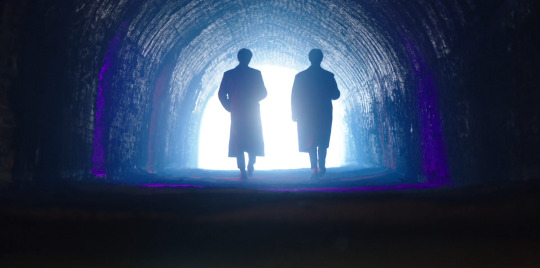
Park Sang Nam's Shin Myeong had good chemistry with Ki Do Hoon's Shin Ho Yoon, echoing the Goblin-Reaper duo from Goblin, what should come as no surprise as writer Kim Eun Sook is a producer for this show. They even paid homage to that iconic walking scene in the first episode. Unlike Ho Yoon, Myeong comes across as less devoted to his duties and more lazy. He himself admits to a disapproving Samshin that he copy-pastes destinies, but also makes an interesting point about only writing main events so that humans can fill in the gaps themselves. I'll let you decide whether this is really his intention or just an attempt to placate Samshin's anger. Consequently, his transition from a somewhat lazy god to a more serious one towards the end of the show was unexpected, but I guess it stands to reason given his worries about Ho Yoon, plus one shouldn't forget he's actually the older god. I do believe the show wasted an incredible opportunity to have Shin Myeong be the linchpin of our story.
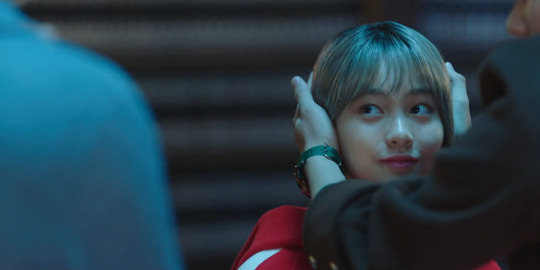
Ho Yoon shields precious Samshin from Myeong's words on how to passionately express love.
As for the characters of Jeong Ba Reum and Samshin, I can say the former was functional to the plot and gets immediately sidelined once that function is completed, while the latter definitely stole every scene she was in (and she's 14!). I would've loved to have seen more of her, even though I feel her arc was a little disconnected from the overall storyline and could've been tied better if the last episode had gone in a different direction.
Execution
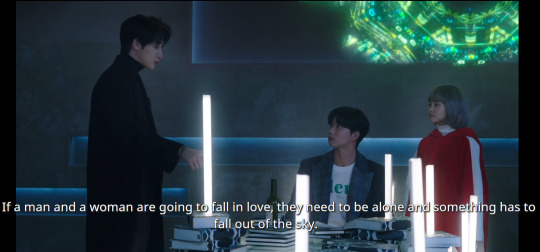
What if that something are meteorites?
The show has a lot of fun making fun of kdrama tropes, either through Che Gyeong's job as a scriptwriter or through the gods of destiny themselves, who take turns between being writers and viewers when coming up with the destinies of mortals. When Ho Yoon is having trouble understanding "the depth within humans which is beyond divine comprehension" (aka love), Myeong steps in to give him some advice on how "For love to happen you need to isolate them," stranding the pair in an island somewhere and having them stay in an inn with only one room available. Other gems from Shin Myeong include, "They got rained on, they're cold, their clothes are soaked. If they start a fire, we're 90% there." and "A woman always falls for a man who takes care of her when she's sick. Under one condition. He has to be good-looking." If you ask me, I think Myeong has been watching too many kdramas. Unfortunately for him, so has Che Gyeong, who makes her living writing them.
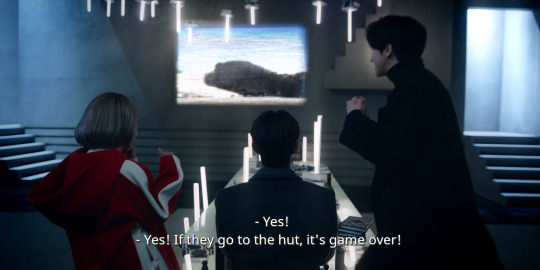
Are they gods or kdrama fans?
As you can see, there's a lot of comedy to be found in the gods' numerous, and failed, attempts to get Ba Reum and Che Gyeong together. However, as I mentioned before, the character of Ba Reum is mostly functional. We learn little to nothing of who he is, how his life has been, what his dreams are, what is a bit off considering he's supposed to be Ho Yoon's "masterpiece." With Ho Yoon and Che Gyeong slowly starting to get closer, as the former tries his best to understand the nebulous concept of love, Ba Reum falls into the background, what isn't really much of a shame as he doesn't contribute a whole lot in the second half of the show, to the point he could've been taken out completely with slight rewrites here and there.
The writing is similarly flimsy when it comes to the rules of the universe. For instance, early on it is stated that whatever gets written on a fate book cannot be erased, and yet when a character accidentally spills coffee on his fate book the ink on the page vanishes as if it were Voldemort's diary (there is also another instance of writing mysteriously vanishing that isn't explained). In another case, it is stated that anyone who knew a certain character got their memories of that character erased, yet one (very secondary) character still seems to be able to recall everything. These sort of plot contrivances are odd in that they are unnecessary and could've been worked around with relative ease.
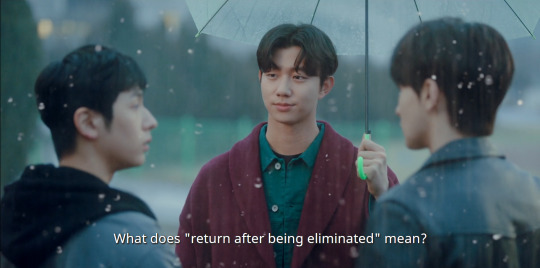
It means we have a problem, that's what it means.
Another, more important, mystery that doesn't get explained is how Ho Yoon is able to "resurrect" multiple times. One of the rules of the universe states that any god who interferes with mortals, beyond the scope of their duties, and develops feelings for them, gets the Thanos treatment. However, it is eventually revealed that Shin Ho Yoon got the boot several times for this and yet was able to return every single time, with his memories erased. No explanation is provided for this and, instead, the show suggests, in the last scene of the last episode, that this is the case for all gods, as we see a couple of them return from extinction.
Personally, I feel there was a lot of potential left untapped here and this relates directly to my comment on how Shin Myeong should've been the linchpin of the entire story. If you'll recall the web drama One More Time, the reason why the male lead was stuck in a time loop was because of a contradiction that arose in the terms of the contract made between the female lead and the Grim Reaper. In a similar vein, I think the show could've suggested that Myeong first met Ho Yoon as a human kid and maybe wrote for him a fate that implied him falling in love or something similar. However, the human Ho Yoon died before that fate could occur and so became the god of destiny Shin Ho Yoon, destined to continuously "resurrect" until he could embrace his fate. A loophole such as this one could've neatly explained Ho Yoon's rebirth cycle.
youtube
The ending itself was a little underwhelming and it's easy to understand why, as it it suggested that Ho Yoon and Che Gyeong are stuck in an endless loop of the former falling in love with the latter and vanishing, with Che Gyeong being the only one able to remember all of their interactions. As fates go, it's rather depressing so it doesn't really jibe well when the show's upbeat main theme starts playing at the end. When I did my episode recaps for the show I suggested that, with some rewrites, we could've made Episode 9 the series finale and the show would've been better for it. How?
Imagine at some point in the show both characters remember everything, perhaps at that wind/lamb farm where Che Gyeong desperately calls out for Ho Yoon who, instead of running to her, walks away out of fear of vanishing for good this time. I would've planted seeds throughout the show suggesting Ho Yoon is developing emotions yet isn't vanishing from some inexplicable reason, and there are already some seeds of this in place. Perhaps he has a talk with Myeong about how strange that is and decides to see how far he can take it. The show would end as Episode 9 did, with Ho Yoon returning to Che Gyeong and asking for a caramel macchiato, the most expensive item. They both smile at the reference to their past encounter and we cut to credits with the main theme playing in the background. Ho Yoon's actions could serve to inspire other gods of destiny to try and write their own fates, like how Samshin (even though she's not a god of destiny) follows in his footsteps and decides to attend school.
Music
If you've read any of my reviews, you know that, usually, all of my recommended shows are accompanied by a soundtrack that not only has good music in it but that is used at the right time. This show has some very good tracks that stand out from their more atmospheric counterparts, such as Lee So Jung's "Skyline" (the show's main theme), Jeong Sewoon's "Time Machine," and Yongmin Ryu's "Chaotic." As far as instrumentals tracks are concerned, the obvious standout bar none is "The Deity of Fate." Other instrumental tracks aren't bad but they just can't hold a candle to this magical piece by Yongmin Ryu that has traces of Hotel del Luna's excellent soundtrack.
youtube
A couple of examples that prove how these tracks are expertly used include the end of Episode 7, that shows us how Ho Yoon and Che Gyeong first met through a flashback, with "The Deity of Fate" followed by "Skyline," and another scene in Episode 9, where Ho Yoon recalls his past and we see a quick transition between different days at Che Gyeong's coffee shop as she serves him a caramel macchiato, with "Time Machine" playing in the background. However, in the same way Ho Yoon conjures up a magenta pink moon to distract Che Gyeong, I do believe the show sometimes relies on such scenes to divert your attention from some of its plot holes or inconsistencies, hoping their beauty and poetic nature will thwart any deeper analysis that it might not withstand. It's up to you to decide whether you can let it slide or not.
Conclusions
In short, Scripting your Destiny is a fun show that doesn't take itself too seriously and that successfully creates a universe and characters I'd love to see more of, while trying to convey a timeless love story that has elements of One More Time, Goblin, and Angel's Last Mission: Love. I don't believe it succeeds in this respect, certainly nowhere close to the OTPs in any of those shows, in no small part because Shin Ho Yoon never makes that transition from deity to boyfriend that is present in shows like Goblin and Angel's Last Mission: Love. The romance between Shin Ho Yoon and Go Che Gyeong is one that looks good on paper and should've translated better to the screen. Having said that, their interactions are quite fun to watch and one could certainly envision a future where the two become a couple, provided Ho Yoon somehow manages to stop getting lobotomized. It's a shame but the series finale makes it lose several points as it doesn't make the most of the show's premise or message.
Would I recommend it? If you've watched and enjoyed the other shows I mentioned, yes, absolutely. Despite its flaws, which can be considered relatively minor to an extent (this is a web drama after all), Scripting your Destiny is still a much better investment than many kdramas and at a fraction of their time, and the comedy value of seeing how it makes fun of kdrama tropes again and again cannot be discounted. You're bound to have a good laugh for sure. Additionally, it features some gorgeous and creative (look at that last picture!) VFX-enhanced sets that rival fantasy dramas like Tale of the Nine-Tailed, which definitely had a larger budget and tried to recapture some of that Goblin magic but couldn't. And if you haven't watched the shows I mentioned watch this one anyway so we can have more good web or mini dramas (Handmade Love is an excellent one that runs the length of a movie) that give kdramas a run for their money. Until the next one!



#kdrama#scripting your destiny#kim eun sook#ki do hoon#jeon so nee#eun sun soo#park sang nam#gal so won#kim woo seok#review#kdramas
5 notes
·
View notes
Text
It’s Not Working: Plot Twist Troubleshooting
Do you like to play with the expectations of your readers? Capture their attention on one plot line while another grows in the shadows? Shock your audience with terrible surprises? Then you may be a sadist. Don’t worry, most writers are. We love to use plot twists to change the direction of the story in an exciting way. When done right, it can make the reader rethink everything that came before. When done not so right? Well, that’s what we’re here to talk about.
What is a plot twist?
A plot twist is a surprising or unexpected reveal or event in the story that recontextualizes the audiences’ understanding of the plot. For example, Star Wars: Luke, I Am Your Father. That’s a big reveal that changes the way we perceive Darth Vader, and the way that Luke thinks of and interacts with him.
Do I need a plot twist?
This is a really big important question. Sure, plot twists are fun, but they also take a lot of work to do in a way that satisfies readers. Not every story needs them. There are plenty of ways to keep readers engaged and entertained without turning the whole plot on it’s head. Take a look at your story. Do you absolutely need a plot twist? If you’ve already got a solid plot, and a plot twist isn’t already an idea you’re excited about, you can probably say, no thank you, and keep on writing. If you do have a great idea for a way the story can be twisted around, then read on.
What are some problems with plot twists, and how do I fix them?
Problem: The plot twist came out of nowhere. The best plot twists are built up over time, where if a reader went back and read the story again, they’d be kicking themselves for missing all of the clues. If there are no hints? Some readers feel it’s more of a cheap trick or ploy rather than a carefully built up plot twist. Readers can get whiplash if you change the direction of the story without any warning, and they can get lost if there’s no real context for the change
Fix: Add in some hints. Sounds obvious, right? But this is actually the hardest things about plot twists. Your clues need to be subtle enough that readers see them as unimportant on a first read, and but noticeable enough that when the plot twist happens, they can’t believe they didn’t see it coming! It can be hard to strike this balance. The best thing you can do is have critique partners or beta readers give you feed back on things that are too obvious or too subtle until you get a feel for the sweet spot yourself.
Problem: The plot twist contradicts something established. This can be the most frustrating. Unless you’re going for a very intentional, established unreliable narrator, readers are going to take what’s in the text as cannon rule. If you start breaking these rules in ways they never saw coming, they’re going to feel cheated. For example, if you’ve laid out the rules of your magic system clearly, but in a plot twist everything we know about the magic system goes out the window? That does not feel like a satisfying narrative choice. Another example, one I’ve actually read and gotten very angry over: if your first person narrator says, in their own mental narration, that they don’t know what happened to the jewel, and oh, no, where could it be, and then it turns out at the end that they were the thief the whole time, contradicting everything they said in narration? Trust me. You’re readers will get mad.
Fix: Work with the world you’ve created. If you’ve established something as true, with no hints that the characters might be wrong about it, leave it as true. You’re a writer. Use your limitations as a ground for creative workarounds. Or, as the writer, you can change or eliminate those limitations! You have all the power here. There’s no reason to lie to readers, because that’s the best thing about plot twists: people get angry because they can’t even accuse you of lying, you just sent their expectations running down the wrong path. Let your readers trust you, and then break their hearts without ever telling them a lie!
Problem: The plot twist undoes character development. A betrayal by one character to another is a classic plot twist. Who could’ve ever seen it coming? There can be great ways to do this, where you can see them beginning to lose touch with each other, or where, after the betrayal, you can see their conflict. These are awesome and great! But if there is no build up, no small hints? We’re back and problem number one. And if we can’t believe that this character would do such a thing without some bit of remorse? We’re back at problem number two. If you have a character developing more and more and then they go back on this, without any sign of conflict or regret, the readers are, again, going to feel betrayed.
Fix: Make consistent character choices. This doesn’t mean if you’ve had them developing more towards being a good character, they only make good choices from now on. It just means that the character feels something about what they’re doing and the audience can see it. Think about the ups and downs of Zuko’s redemption arc, especially after he turned on Uncle Iroh. Were we disappointed he didn’t do the right thing? Yes, but did we believe it because we saw his characterization through the whole thing? Also yes. Let your characters be characters, not just tools for plot twists. You’ll end up with a much deeper story that readers are going to be more invested in.
Problem: The plot twist betrays the tone promised to readers. If we went in for a lighthearted comedy and someone is brutally murdered and the characters are running for their lives and it’s not at all funny anymore, well, that’s another reader betrayal. Plot twists should change the context of the plot, not the tone. If you’re on an angsty contemporary romance, then it should stay in that genre. If it’s dark and brooding, let it stay that way. The reader picked up the book cause they liked what they saw. They don’t need a change in that somewhere in the last half of the book.
Fix: Make sure the plot twist is reasonable to your plot. They world doesn’t need to blow up in your murder mystery, and the love interest doesn’t need to ask someone else to space prom in your sci-fi action adventure. Let your plot twist work for your story, not too big, not too small.
Plot twists are not easy to master, but hopefully this quick troubleshooting guide has helped you get a start on them. Go forth and torture your readers to your heart’s content.
#writing advice#writing community#writers of tumblr#writeblr#writblr#its not working: troubleshooting for writers
247 notes
·
View notes
Text
I Saw The Crimes of Grindelwald
And like any movie, there were things I loved.
Baby. Nifflers.
The freaking artistic departments and the COSTUMING were all very beautiful.
I liked Theseus Scamander more than I thought I would - maybe I was getting more realistic older sibling vibes, maybe his human moments just hit me. Idk.
OMG the cast performed so well??? I’d literally just list all their names if I wanted to point out anything specific. If you’ve seen the movie yell about the spoilery things in the comments with me?
SPOILERS BELOW
Okay, Leta was awesome and I had honestly expected her to follow Grindelwald? But they definitely broke expectations with this one. Really pulled a Last Jedi on us in that regard - the person we expect to be tempted to the dark gave her life for the right reasons, and one of our brightest, most hopeful and wholesome characters in the first movie goes dark.
BTW she made me want to cry when she screamed “Walk with me,” ugh. I really hope she doesn’t die still on Grindelwald’s side. The man must be a powerful occlumens to not reveal his actual endgame to a legilimens that just hears people without even trying. I’m glad it wasn’t just “for love”, though that is a driving factor for her - it’s for freedom to express that love, and being caught in a moment of vulnerability in the crowd, and Jacob finally calling her crazy out loud for that decision.
Also, like, can we talk about how her descent into darkness was definitely not unexpected? She enchanted Jacob to keep him compliant! I mean, I get it - but Jacob was the one who loved more in that scenario, because he cared more about her than about them being together. She could have campaigned for the right to marry him at the Ministry - but she went with mind control. There’s a clear difference in what she believed was right and wrong versus others.
IDK I just hope that if she does come to a breaking point it won’t take someone killing Jacob to bring her to the Light again.
Nagini was pretty cool even though she was just kind of along for the ride? I liked her companionship with Credence. Unfortunately we already know how her story ends.
Okay, gonna touch on Johnny Depp - I’m not extremely well read on the irl controversy and really based off of what I know I can’t personally condemn or acquit him just because I don’t have all the info.
But I’m able to separate a person’s actions from their work either way and - he was a goddamn good Grindelwald. Very charismatic and softspoken when he needed to be, cruel in turn to see where loyalties lie, and he knew how to push all the right buttons. The only part that just made me giggle at the absolute wrong moment for a movie to make me want to giggle (with death and destruction on the line, ugh) was the “I hate Paris”. It was too cheeky for me at that moment, idk.
ON TO HOGWARTS
Freaking Jude Law, ugh. He definitely was an amazing Dumbledore. I was all for his performance, and there were definitely images with the Mirror of Erised scene where I just was like wow, you two had such a profound bond. And Grindelwald used “The Greater Good” line, which was a thing between the two of them regarding their positions on this whole new world order thing. He’s enigmatic and friendly, especially in his interactions with Newt and Leta.
(OMG McGonagall was there for a hot second and it was perfection)
Theseus Scamander, my friends. He is SUCH an older brother around Newt. I am an older sister, and can confirm. My heart broke for him when Leta died, omg.
and Flamel was unexpectedly hilarious and simultaneously badass?
Tina was kind of following a trope that I expected of the spurned girlfriend, so meh on the storyline but A+++ with the “salamander�� dialogue between her and Newt and the moment when she pulls out the little bell toy.
I don’t have much to say about Newt because he was very typical Newt. It worked well and I was glad he wasn’t the only main player in the movie, but I adored every bit of him.
AND OKAY THE NIFFLER BEING THE ONE TO STEAL THE THING FROM GRINDELWALD OMG
Okay, you’ve guessed that I’ve been holding back on the Credence bit because -
What the actual fuck?
Okay, the very first option is that Grindelwald is a lying liar that set it all up, and that would not be a surprise honestly.
(Gonna still call him Credence for a bit on account of that notion)
But these things tend to be important, these “phoenixes come to Dumbledores” type of things. So I’ll take it as truth for now.
And we have heard nothing about an Aurelius Dumbledore even existing until this point - and we know very little about Ariana and Aberforth. So I suppose it’s plausible that we never heard his name before. Still!
He has been pulled from every side for every reason to use him or destroy him, and that breaks my heart. Look at how freaking powerful he is at the end at Nurmengard (which we know later, of course, will be Grindelwald’s prison) - all he could do. And that of course worries me, because under Grindelwald he could do a ton of damage.
The one good thing Grindelwald does, imo: give Credence a freaking wand. Ezra Miller has been waiting too goddamn long for this moment, probably vibrating in his seat with excitement, let him be a proper wizard.
And how in Merlin’s name did he get where he is? I have a pretty interesting timeline.
Ariana Dumbledore, the youngest Dumbledore until now, was an Obscurial child because of muggle bullies. She died during a fight between Albus, Aberforth, and Grindelwald (who may have already witnessed her power and had ideas of how to use her? Albus hadn’t enjoyed the burden of caring for, essentially, a disabled sister. Maybe he had been wondering how to take her off his hands, and Aberforth had seen it coming and that’s how that mess occurred.)
Anyway, she died in the fight - no one knows who killed her out of the three. This was 1899.
Credence was born two years later.
Now, he doesn’t necessarily have to be a brother - he could be a cousin - but I’m super inclined to think that if he is indeed Aurelius Dumbledore, that he’s the youngest brother, or at least is symbolized as such if he is a cousin. (Wizards live a lot longer than average humans, so it’s totally plausible to have siblings that far apart I think) It would be a different mother, because Kendra Dumbledore (Albus’s mother) died some time the same year before Ariana did.
And Albus, upon finding out about Credence and perhaps guilty about his own treatment of Ariana, thinks I am not fit to care for a child keep away and offers to send Aurelius and his mother to America. Thus we have Credence.
NOW this is assuming we don’t get an entire retcon of the Dumbledore history. If we do that, then my mini-headcanon is a bit more disturbing.
We know very, very little about Ariana Dumbledore. We didn’t know she existed until the seventh book. Same for Aberforth. We learn a lot about Dumbledore all at once from some unreliable sources (Skeeter etc) through Harry, who finds certain information more important than other info.
I looked up the timelines earlier, so the first theory fits better with canon. If we throw timelines and whether Kendra Dumbledore died at a certain point out - if we assume that the little tidbits might be wrong -
What if Ariana wasn’t hidden away in the house? What if she was born later? What if she and her mother moved to America when it became clear that Albus wouldn’t support them?
And this is sort of fanfictiony, and very weird, but what if -
Aurelius was Ariana? I mean, Obscurials. Dumbledores. What if Dumbledore didn’t love his sister enough to keep her close, and supposedly lost her to a storm at sea?
What if, in a bout of childhood accidental magic, Credence changed their own body, uncomfortable as a little girl?
(This leads Mary Lou Barebone to scream about witchcraft for the rest of her days, but she still takes care of the cursed little boy. She feeds him, houses him, hopes his sins will be forgiven, punishes him because he’s a little curse on her too, and Lord if it happened to her-)
So Albus believes Ariana to be dead, but if he can save this Obscurial boy, just maybe -
Yeah. Okay. So. Tangent over, fanfiction to be written, this movie was great and weird and confusing and cool. Ta-da.
#fantastic beasts#fantastic beasts 2#fantastic beasts and where to find them#the crimes of grindelwald#reaction#spoilers#fbawtft#fbawtft2#tcog#newt scamander#queenie goldstein#tina goldstein#jacob kowalski#albus dumbledore#gellert grindelwald#theseus scamander#leta lestrange#credence barebone#nagini#aurelius dumbledore#speculation#headcanons#comment to discuss i wanna know
49 notes
·
View notes
Text
Title: Let Your Hair Down, Rapunzel
Author: @catfishmaster
For: @k-thiswasmydesign
Pairings/Characters: Beyond Birthday & Ryuk
Rating/Warnings: Murder
Prompt: B/Ryuk meet/interact
Author’s notes: I think this was supposed to be a fanart prompt? But I thought the idea was interesting so I decided to write it. I hope you like it!
Ryuk hadn’t expected a human to be so calm, it was fascinating. A lot of humans piqued his interest but there was something… different about this one. Darker. He’d seen humans before, and he was so worried that someone boring, someone obsessed with normality, would pick the notebook up. So when it landed in the hands of this eccentric creature with a name he’d never seen before, Ryuk was more than a little intrigued.
He was even more intrigued, and more than a little annoyed, when ‘Beyond Birthday’ refused to acknowledge him at all. He’d flown into his cell while he’d been wide awake, and the only reaction he’d shown was a smug satisfied smile on his disfigured face. It was enough to sufficiently piss Ryuk off. And yet, that was even more curious. He’d asked him plenty of questions but Beyond only responded with the occasional, ‘Piss off’ or ‘Go away’.
It was one day, when everyone was at lunch, and B sat alone as usual. He was writing things onto a scrap sheet of paper with nothing but pieces of food, it was pretty grotesque.
“You’ve been writing a lot recently,” Ryuk pointed out.
“So I have,” Came the unexpected reply.
“You’ve been writing a whole lot, but you’ve never tried to get out of here. Why’s that?”
B’s disfigured face once again contorted into a smile. “Are you asking me to spoil the surprise, Shinigami?”
“I can’t take this anymore. Just hurry up and get out of here or do something.”
“I don’t recall asking you to stay.”
Ryuk makes a growling noise. “You should start thinkin’ about being a little more polite.”
“Or what?” Beyond levels his gaze towards Ryuk and sticks his finger into his jello and licks it off the end of it without breaking eye-contact.
“I still have my notebook, you know.”
“Fascinating.”
Ryuk cocks his head. “You got a death wish or something?”
Beyond lets out a bitter laugh, loud enough to cause the other prisoners to turn around and stare at him for a split second.
“Well, about that,” Beyond hisses at him through a thin smile, “Wanna know how I got these scars?”
—————————————————————————————————————————————————————————————————-
The sun goes down, as it always does. And Beyond Birthday is once again confined to his cell, with nothing but his Death Note and the death god who won’t leave him alone for company. Ryuk, he said his name was. He said a lot of things, and Beyond pretended not to listen. Better not to let him see any reaction and hide it under a mask of muted disinterest. He has to give this creature a show, it’s already made that much clear. Beyond is a trained performer, so a show he will give.
“Today’s the day,” Beyond says, not looking up from the novel he was reading.
“Huh?” Ryuk says, sitting up from pretending to sleep.
Beyond simply smiled and raised his hand as a guard, B R O C K T O P H E R 1 4 5 6 0 4 9, specifically, walked past his cell and flung some keys at him. B caught them, of course. He was a master of dexterity. “He has approximately fifteen minutes before he’ll hang himself in the cafeteria.”
Ryuk started hissing with laughter. “No kidding.”
“Shall we?” Beyond smiles through cracked lips as he flings his book aside and snatches the Death Note from under his bed. Ryuk grins widely at him. There were several low chuckles coming from the place where his rotted yellow teeth resided… Okay, it was clearly a mouth. Really, for a shinigami, Ryuk was quite boring biologically.
Beyond stepped out of his cell and strolled out of his cell block while all the guards said nothing, not noticing him, because he’d made them not notice anything anymore. They’re already dead, really.
“I have a question, Shinigami.”
“Oh, do you now?” Ryuk was having fun, at least.
“This notebook,” He raises the notebook for emphasis. “It can lower lifespans.”
“Hm? What!? How the hell- I don’t remember telling you about- Err, yeah it can.”
Beyond ignored the rest of what he said. “I see. Previously I hadn’t thought that possible.”
Ryuk made a noise that gave the implication he was confused about something, which was information Beyond had already gathered and dismissed. “And… can it… extend them?” Beyond says, gnawing on his already blistered lips.
“You want to extend a lifespan?” Ryuk blinks in surprise.
“Answer the question.”
“It can extend them for about uh… what was it again, twenty? Twenty five days? Though, I dunno why you’d want to do that.”
“You’re a disgrace to your species.”
Beyond could feel Ryuk’s eyes narrowing at him, but the Shinigami kept his mouth shut.
He stepped into the reception room, where another security guard was there. He offered B a set of clothes, and bowed once he was done. “Thank you. Now die,” And the Security Guard promptly shot himself in the head.
“You must’ve written a lot of names down, huh,” Ryuk said with a snicker.
“Mhm. They’re all pigs anyway,” Beyond pulled his shirt over himself and wrapped the coat around himself, feeling the chill of the night outside. “Frankly, it’s a mercy.” And L clearly needs a reminder I’m here.
“Whatever you say.”
“Is that judgement I detect, Shinigami?” Beyond pried the pistol from the stiff fingers of the the dead guard.
“Heh, I don’t have any reason to judge. I’m just here to watch, remember?”
Beyond looked up at Ryuk, “You’re a unique audience, I’ll admit.”
“You’re a pretty weird performer.”
Beyond’s eyes narrowed at him before he lets out a humming noise. “Whatever you say,” I don’t trust you, Shinigami.
“Hyuk,” The Shinigami made a noise that resembled a laugh mixed with a scoff, but the answer was clear. Neither do I.
Glad we understand each other.
—————————————————————————————————————————————————————————————————-
Beyond sits on top of a Gas Station on the side of the road, the owner has long since vacated the building, leaving Beyond the space and freedom to throw tiny stones at the odd passing car and feed Ryuk apples, chocolate and other sweets after having introduced them all to him. Of course, nothing compares to apples but he seems to like gummy bears.
His car had broken down hours ago, so he’d been forced to walk here, the journey had not been pleasant.
“It’s too easy,” Beyond says after throwing a stone at a passing truck, earning a middle finger and a curse from the driver.
“What now?” Ryuk says, looking up from his overplayed comical way of eating.
“This thing, it isn’t fair.”
“The Notebook? Yeah, of course not.”
Beyond makes a humming noise, nicks a snake from Ryuk’s food pile and swallows it whole.
“I’ve fantasised about burning this world to the ground since I was a kid.”
“Well, lucky you can now, right?” Ryuk says with a chuckle. He’d love it. Watching this entire world writhe in agony as Beyond wrangled all life and hope from it. There’s something about him, it’s not sadism, not quite, but he’s his own version of twisted. It’s one of the few things that Beyond is afraid of.
“It’s too easy.”
“…Huh? Come again?”
“It’s too easy.”
“The hell does that mean?”
Beyond pauses for a moment.
“You know, I’m honestly not sure. It just feels wrong, like I should be back in Jail. Like this thing never should have fallen into my hands.”
Ryuk stares at him, there’s a glimmer of knowledge in his stupid muppet eyes. Something he knows that Beyond doesn’t, obviously. It all but confirms what he was thinking.
“Humans sure are confusing,” He says, “Never knew a Shinigami to lose sleep over something like that.”
“You don’t sleep,” Beyond said absentmindedly.
Ryuk laughs.
“It’s more than that, I think,” Beyond muses.
“You’re telling me this?”
“You asked.”
“Yeah, guess I did,” Ryuk laughed, “Doesn’t mean I care.”
“No, didn’t think you do.”
There was a pause for several seconds, around forty by Beyond’s counting.
“So.”
“So,” Beyond repeated the word.
“Where to next?”
Beyond waited around twenty three seconds before answering, which was time enough for a truck to pull up at the gas statio, even though it was abandoned. Must not have goten the memo. “Well, I suppose I have a score to settle.”
“Oh-ho? Sounds fun.”
“Oh, yeah,” Beyond says with a grin, trying to find the anger and fire inside of him that’s long since been blanketed with fear and misery. Put on a show, put on a show, you’re the villain in this story, put on a show or die, those are his terms. “Real fun.”
He drops off the roof of the gas station and lands steadily on the truck. The thud is enough for the driver to try and stick his greasy head out the window. He doesn’t see anything, so he steps out of the car. Beyond gets a better look at his face then, and he can see the glowing red of his name and lifespan above his head.
J a C k S o n R o W l e Y
The numbers aren’t relevant anymore. All he needs to do is scribble his name down in the book, and he’ll have fed another clueless victim to the jaws of the monster at his shoulder, and the monster in his head.
It’s a small price to pay.
There’s no blood on his hands this time, only ink.
8 notes
·
View notes
Text
Oregon Trail II: The Sequel that Nobody Asked For

Of all the games that did not need a sequel, The Oregon Trail has got to be darned near the top of the list. While the trail blazing (pun intended) edutainment blockbuster conflates numerous journeys across various routes spanning decades of the 19th century, it’s safe to say that for a humble 1980s computer game, it did an incredible job of letting kids know what the pioneering experience was all about.
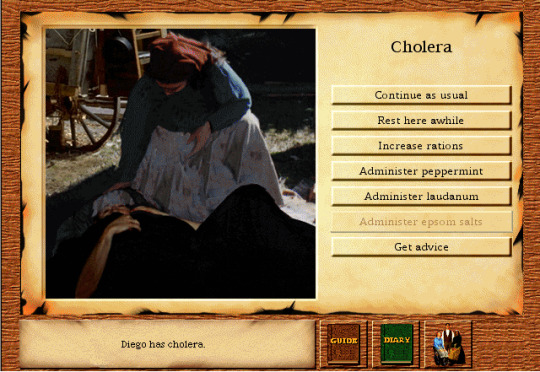
Spoiler alert! It was mostly about malnourishment and dysentery.
For those unfamiliar, The Oregon Trail was produced by the Minnesota Educational Computing Consortium, known by schoolchildren everywhere as MECC. The game was released for numerous platforms, including the Apple II, DOS computers, and the Atari 8-Bit platforms. Its popularity cannot be overstated. Such popularity led to releases to newer platforms, prompting updates to extend the game’s longevity. The Apple II version eventually gave way to the Macintosh version, the DOS version likewise was retired in favor of Windows.
Updating an educational piece of software like The Oregon Trail seems like the perfect strategy for perpetual sales. The historical framework that the game is centered on doesn’t change, but could easily be adapted into more modern forms of video game storytelling, allowing kids to get a better and better representation of what the endeavor might have been like. Simply updating the game and re-releasing it would seem like a practical inevitability, just as the math in textbooks doesn’t change, but new editions keep being made anyway to feed the publishing industry monster, whose thirst for paper is insatiable.
MECC did keep up releasing Oregon Trail for as long as it could. Interestingly, though, somewhere along the line, they got the idea in their head that putting a new paint job on the game and slapping that classic logo on the box just wasn’t quite enough to keep interest up. No, fueled by the lust for the dollars that sequels bring, MECC decided they were going to make Oregon Trail II. I know what you’re thinking: “How on earth could MECC top their greatest creation?” Or maybe you’re more realistically thinking “How can you create a sequel to a historical event?” Let me tell you how.
Oregon Trail II: The Oregoning (if only) is the exact same game as its predecessor in just about every meaningful way. What exactly was the difference, then? Why, oh why did this thing need to be brought into the world? The CD-ROM, of course. CD-ROM technology ushered in a revolution of adoption for computers. For a multitude of reasons I don’t have the time nor expertise to suss out here, CD-ROMs fundamentally altered how the public thought about computers and their utility. At the heart of it seems to be that the data storage capacity of these optical discs meant computers could render more convincing and realistic worlds to the masses, making computers less mysterious and threatening, and much more inviting, like a VCR.
CD-ROMs meant that encyclopedic knowledge could suddenly be stored and accessed not in heavy and annoying to thumb through books, but rather on light and easily searchable programs loaded from the disc. Looking back, this all seems a bit quaint, but it was very exciting for the time. This was before the internet had become such a staple of modern life, so having easy access to lots of data via compact disc was very attractive and opened a lot of possibilities. These possibilities were especially attractive to game makers. Remember, it was the compact disc that caused Squaresoft to jump ship from Nintendo to Sony, giving us Final Fantasy VII. To date, there has not been a superior invention. In any case, MECC, like Squaresoft (only two years before Squaresoft), saw the potential of CDs to really give their tried and true Oregon Trail a kick in the pants.
While the hype was literally unreal for this sequel, we do have to be real about it. Oregon Trail II is almost exactly like The Oregon Trail. Nearly every change is superficial in nature, but those superficial changes apply to essentially every aspect of the game’s presentation. The first thing players will notice is that Oregon Trail II has a full musical score, and, depending on your taste, that score kicks ass. Music of this quantity and quality was simply not possible on this scale before CD-ROMs had become the main platform for computer games. Along with the music, the game features numerous voice samples, which add a nice element to the various characters that the player can interact with over the course of their journey. While text works just fine, let’s face it, having the words spoken to you makes it both easier and faster to understand. While I wouldn’t say the actors are stellar, for an educational game, they are perfectly adequate, on par with what you’d get visiting a historical re-enactment of some kind.
Graphically, the game received a huge upgrade as well. Digitized actors were placed in the game, making the re-enactment comparison that much stronger. In the beginning of the game you can explore the town adventure game style with each location being a single scene populated with various NPCs. While hopelessly dated by modern standard, it would be difficult to say that in 1995, this didn’t seriously enhance the immersion that the game was going for. What was just a simple screen where you input numerical values for the supplies you wanted became a place you could explore, which is always nice.
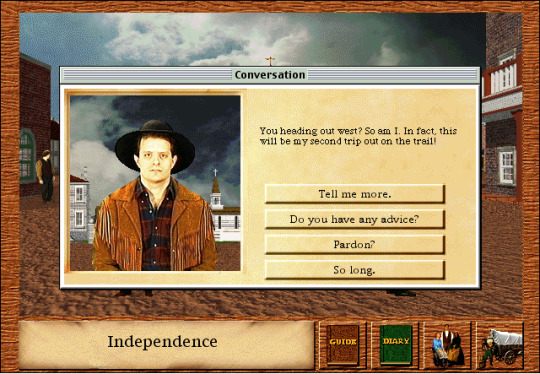
This actor’s face says “No amount of money is worth this.”
The player is faced with multiple choices they must make in order to make their trip to the West successful. Lots of unexpected events will take place, such as oxen dying, yokes breaking, people getting ill or lost. Whenever hardship falls upon your party, you must make a decision regarding how you will proceed, and your choices affect what happens next. You’re not alone, however, as the people you travel with can be consulted, adding an extra dimension to the experience.
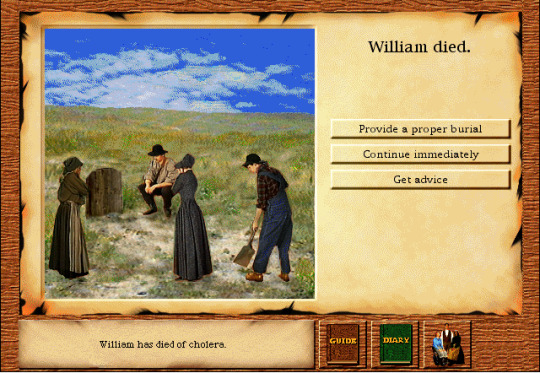
Not sure how we could continue immediately when we’ve already buried him.
The most useful update came in the form of the map that would fill the screen as the player made their way across the trail. It is a highly detailed map, which gives both an incredibly accurate reading of where you are at any given time, but also helps set in the scale of this journey. In the Apple II days, it was admittedly a bit difficult to get a sense of just how grueling this journey must have been. Sure, all your party members were likely to die horrible deaths along the way, but that occurred around a nice animation of oxen walking. Oregon Trail II feels much more traditionally educational with it’s map tracking, but seeing the topography of the area and watching as you make your way from one side of the map to the other, only to have it adjust to a whole new section of map hammers home the fact that this trip was insane.
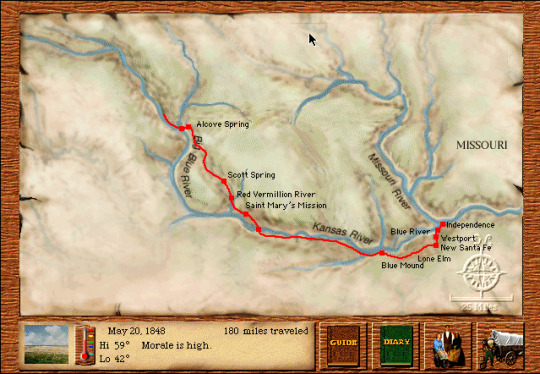
Ultimately, the wow factor of CD-ROM technology did not make Oregon Trail II the runaway success that The Oregon Trail had been. I’m pretty sure the only reason I played it back in 1995 was because my parents taught elementary school, and thus my home was full of all kinds of education software. On a personal level, I absolutely loved this game, even more so than the original. I’m aware, however, that it had no real chance of supplanting the classic that defined edutainment for so long. Something as iconic as The Oregon Trail is a rarity in any medium or industry, and it would be foolish to think that repackaging something and calling it a sequel could have the same impact. Whether or not the good people at MECC thought it would, I have no idea, but I’m glad they went ahead and made it, anyway, if for nothing else then to hear the Trail theme go from upbeat to more and more frantic and ominous as my party inches closer and closer to California, and cholera, and measles.
6 notes
·
View notes
Text
Fic Writer Questions

Thank you so much for the tag @in-arlathan 💕 this is definitely the first time I’ve had to think about things like this - this is going to be fun!
I personally don’t know a lot of writing friends on Tumblr (because I’m very new to the world of fic writing - well, writing in general 🤪) but I’ll tag whoever (even though I think most are strictly artists?)
Anywho, those who can/ want to, feel free to answer these and be sure to tag me back - would love to read what you have to say :) @sopml @noire-pandora @tragic-lavellan @felassan @followingthewolf @an-egg-broke-my-heart @rubihowl @faelavellan @lethendralis-paints @himluv @serial-chillr @soulconsumingginge @thedreadblog
~~~
I’ve cropped my answers for the sake of people’s feed 👇
1. Do you enjoy the occasional trope? Do you enjoy them all? Or do you hate tropy stuff with a passion?
Firstly, I hope the tropes I mention are actually tropes (but apologies in advance if I what I ramble on about isn’t officially a trope). But I guess I don’t mind the occasional trope but normally it would be nice to have a story without it - I like surprises and unexpected events. I guess as a teenager I loved your Boy-Meets-Girl tropes a lot, but now I honestly hate them. Predictability in a story, to an extent, is a mood killer for me and I find myself bored. I know it’s hard to expect writers to essentially “reinvent the wheel” when it comes to writing unpredictable and trope-free stories, so I completely understand how some tropes are almost hard to avoid but if a story is solely reliant on tropes then I’m not interested.
2. Which tropes are you favorites? Which ones do you avoid? Have you written any yourself or is there one you really want to write?
Favorite Tropes: I don’t know the “official” name of tropes but I will just describe them as best as I can in no particular order :)
Opposits Attract: From the top of my head I think of Hermione&Ron, Monica&Chandler, Ross&Rachel, Repunzel&Flynn and Bull&Dorian when it comes to this particular trope. I think so many REAL relationships are between two people who are so dissimilar in a lot of ways. That the weaknesses in the one character are the other character’s strength (e.g. one is disciplined and the other isn’t). One relationship I wish happened canonically is Zuko&Katara from Avatar. In saying that, when two characters who are so grossly different get together then that’s something I struggle to wrap my head around as it feels forced and unnatural. But if done right, you know that those two lovers are together because of how REAL their love is for one another despite their differences, and that they aren’t in for what they “get out of it” and how “easy it is” - they’re in it because they love each other so truly and accept all the good, bad and ugly in between.
Star-Crossed/ Lovers in Denial: I guess it goes without saving for me (being in Solavellan hell and all) but having two characters fall in love almost against their better judgement and how they deny their feelings for so long is something I really enjoy. And guess what? All my examples from the top of my head are all Dragon Age ones 😅; Loghain&Rowen, YourWarden&Alistair, Hawke&Fenris and Trevelyn&Cassandra are relationships that blossom without at least one of them looking for it and how it catches them off guard. And when they do finally admit their feelings its a really big, spontaneous and passionate moment. However, I hate it when they deny their feelings for too long - in this case I’m talking about Blackwall’s romance as an example. When I watched Blackwall’s romance, I got really frustrated with his constant “No, I can’t” that it really made me want to scream lol. Oh! Just thought of another one that isn’t a DA related; Elizabeth&DrDarcy :)
The Underestimated: I enjoy seeing a character underestimated and then proving everybody wrong by being the most powerful, strongest and most incredible one in the room while everybodies mouths are agape. But not by turning into the bad guy, but by simply showing the others that they shouldn’t be underestimated. I think of Toph, Aang and Solas in this regard. And even better, is when the characters don’t need to “show off” their power. I loved how with Toph she was the most powerful Earth Bender but was the smallest and youngest person in the room, and everybody she met underestimated her! And with Aang being you know... the most powerful person in their world and is merely a child. Then of course, we all know Solas’s story: creating the Veil, that Mind Blast in Trespasser, petrifying people to stone, killing dwarves in their sleep and having his Dread Wolf form living in the Fade... yeah. Total sucker for underestimated and not-your-typical powerful character.
Tropes I Avoid: Again, don’t know the “official” names and from the top of my head :)
The Dumb Blonde: Whenever I see a superficial, stupid blonde woman I get really mad. I actually take it personally as I was called a “dumb blonde” myself growing up for simply having blonde hair. I’m sure you’ve heard of “blondes have more fun, but brunettes remember it the next day” joke and omg... it Really. Grinds. My. Gears.
The Mirror in a Horror: I almost never watch horrors, but whenever I see anyone stare into a mirror, open the cabinet and then close it to find somebody suddenly standing behind them, it really makes me roll my eyes back into my head. Look, I still close my eyes because I can’t hand jump scares (even when I know they’re coming) but even still... lol
The Hero Survives: Perhaps an unrealistic expectation, but whenever a story has the blatant knight-in-shining-armor hero, you know from the beginning that they aren’t going to die. That’s why the Red Wedding made me question everything I knew lol. It was totally unexpected! But when you get to the end of a movie and the hero is fighting the bad guy; at first the hero is winning, then the bad guy gets the upper hand and they (the creators) try to fool you into thinking the hero will die (aka the Bad Guy Monolauge) but then suddenly the hero fights harder and wins... ugh... However, I’m not saying the hero must always die, but I like the idea of the hero dying and somehow surviving quite unexpectedly. I think of Ciri from the Witcher: Geralt (and you) totally thought she died but she didn’t! Also, Harry Potter - he died but then also managed to survive!
The Good-Guy to Bad-Guy: I can’t stand the origin of a lot of your “typical” bad guys. This is kind of linked to “The Underestimated” trope I like, but I can’t stand it when they use it as the “explanation” or “excuse” of why the bad guy is the antagonist . I think of Ursula from the Little Mermaid, Hades from Hercules and Maleficent. I think the creators are perhaps trying to get you to sympathize with them (and I do feel sorry for Corypheus, but that’s another post lol), and their origin stories do tug at the heart strings, I just get frustrated with characters who choose to take the “evil” route when they are underestimated, treated poorly or bullied. I guess because in reality there are so many different ways one can deal with being treated poorly other than being a horrible person but yeah... Simultaneously however, what’s the solution? Where should antagonist’s come from? What should their origin story be? And honestly, I don’t actually have a solution XD I guess it depends on the origin story and what caused them to “turn bad” for it not to bother me so much. Because usually you can smell the antagonist a mile away when stories do this.
“American” High Schools: What I mean by this, is that I’m sick and tired of the main characters in high school movies or shows falling into the “jock”, “nerd”, “cheerleader”, “geek”, “perve”, “virgin” or “bullied” category. Especially - ESPECIALLY - the Jock & Cheerleader teasing the protagonist and the protagonist usually being in love with the Jock’s Cheerleader Girlfriend, and then his best friend being the flamboyant, funny one... just no. NO MORE. As soon as I see any TV show or movie use this trope as it’s main “hook” I avoid it like the plague. I understand that perhaps there are a lot of high schools where people perhaps do “fit” into one of these categories but I’m sorry, people are far more complex than that and they are more than just being “the jock” or the “cheerleader” or the “geek”. And of course what goes with all of that is the typical choice of dress, talk and attitude associated with falling into those categories: your “jock” with his jacket, the “cheerleader” with her short skirt, the “geek” whose awkward and wears glasses. Just... enough. That’s enough.
Rain at a Funeral: I don’t think I need to elaborate on this lol
Writing Tropes: I haven’t actually thought about writing anything other than my Halla & Wolf series right now but perhaps if I had to think of a trope I wouldn’t mind tackling, it would be a Lovers in Denial one. I want to write characters that really hate each other in the beginning but are forced to interact and overcome certain obstacles with the help of the other, and then they see other sides to that character they weren’t expecting to see and then they fall in love almost begrudgingly. But then their love is so passionate and real that you can feel how true it is in your bones because of how they got there. Just like if Zuko&Katara got together. Their story and how I think should have ended would be a great source of inspiration for me should I write something like that.
3. Do you have different preferences for reading than you have for writing? If so, is there a reason for it?
I’m currently reading through the DA books in chronological order (I’m currently on Last Flight) and the last time I read anything prior to that was all of Meg Cabot’s books - which was like, 10 years ago. But I think that the type of books I enjoy reading are fantasy ones and after the Little Women movie, I really want to read the book now. And I also loved reading Jane Auston’s books. But it’s hard to answer this one because I haven’t written anything other than my Halla & Wolf series and the last time I did attempt at writing my own stories was when I was like... 12? Hehe
~~~
Phew! I did NOT expect this to get so long but who knew? I certainly didn’t know I had so much to say 😅 thanks for reading all my babble if you managed to get through all of it lol this was certainty fun to do!
#Fic Writer Questions#Tropes#FavouriteTrops#Tropes I Avoid#Fan Fic Writer#NOT Dragon Age#Get to know me
0 notes
Text
“WARNING: Click_Here”-- Classic Horror Film as Interactive Screen.
"You were tricked by your own imagination, Mrs. Rand" - Dr. Maxwell in I Walked with a Zombie
"The brain is the screen. I don't believe that linguistics and psychoanalysis offer a great deal to the cinema. On the contrary, the biology of the brain–molecular biology–does." - Gilles Deleuze, "From Philosophy to Cinema" in Cahiers du cinema 320
"If a film, which is already both the dream of its maker and the dream of its audience, can present itself as the dream of one of its characters, can it, finally, appear to dream itself?" - Bruce Kawin, Mindscreen: Bergman, Goddard, and First-Person Film.
"Something bizarre about the cinema struck me: its unexpected ability to show not only behavior, but spiritual life...Spiritual life isn't dream or fantasy–which were always the cinema's dead ends...Spiritual life is the movement of the mind." - Gilles Deleuze, "From Philosophy to Cinema" in Cahiers du cinema 320
In Bruce Kawin's influential 1978 book, Mindscreen: Bergman, Goddard, and First- Person Film, the author makes the argument that first-person narrative film can be thought of as reflecting (or, standing in as a kind of synecdoche for) the mind of both the viewer and the filmmaker, something he terms the "Mindscreen".
This idea is driven precisely home in his quote above, which is clamped, if you will, between the twin pincers of another great thinker of the cinema, Gilles Deleuze. Here, we find a shocking thesis: Can a film possess that most human of qualities (thought)? Can a film, in fact, be a sleeping being of sorts?
What is so intriguing about Kawin's quote is not so much its fantastical, psychological metaphysics, but that it could reflect another possible thesis (when coupled with the material-spiritual thinking of Deleuze): that of film becoming an interactive screen. What is meant here is that, if we squeeze out the idea of the dream (and, by default, the whole clinical-psychological apparatus of the dreaming subject) between the two clamps of 1) molecular biology of the brain, and 2) the (Bergsonian) "movement" of the mind executing the procedures of “thinking”, we can start to view the screen as a site not of dreaming, or of "being", but as a space of interaction where the viewer's perception and consciousness moves in-and-out to interface with the formal systems given in a film.
--
Perhaps the easiest way to go about describing this "interactivity" of the cinematic screen (1) is to talk about "fantasy" in film, or the "fantastic"; that genre of film which, in the third quote above, Deleuze seems to say is a cinematic "dead end". Though the philosopher has a point in the sense that film can not actually materialize the fantastic, films can present formal constructs that hint at things of a fantastical nature, and therefore it is these "things" (the formal constructs) that become the interactive elements within a film.
And, this is precisely why most, if not all, of the "fantastical" or "fantasy" movies of the last decade (ones utilizing the technologies of 3D modeling, animation and 3D theatre projection) simply fall flat in just about every intellectual regard. They are just not interactive enough; everything is provided to the viewer with regards to his/her imagination through the wild, video game-like whirl of 3D animation. So much so, that there is nothing left to imagine. The viewer is, in effect, left in an intellectual/experiential desert akin, perhaps, to the space Robert Duvall's THX-1138 character is trapped in: a seemingly infinite "Ganz Field" of empty white light (2).
One of the best ways to go about finding these formal interactive points that allow for a true movement of the mind (and spirit), is to go back to the classics of horror and/or fantasy from the days long before the onslaught of computer generated "fantasy" took over the cineplex. For our present purposes, two excellent, WWII-era (3) films by the director Jacques Tourneur will do splendidly: Cat People of 1942, and I Walked with a Zombie, 1943.
Cat People
There are numerous liminal moments and clever points in Cat People that allow (indeed, insist upon) interaction by the audience. These points of interaction are not just "clever" in a facile sense either, but act as perfectly set positionings that allow the viewer to interact with the screen at moments where "fantasy" couples with the real.
Perhaps the most significant interactive trope Tourneur uses in Cat People is the play between light and shadow. This takes place throughout the film in moments where a plant will obscure part of the image with its darkness; where sectors of space and character are illuminated by a street lamp; where shadows are moving across walls in enclosed spaces; when reflected light off of water in an indoor pool creates a kinematic field of brightness and equal threads of darker; and, in this same scene, when we think that the female lead has transformed into a panther, there appear cat-like shadows along a wall (only to have her appear quite like a normal woman when she flicks on the light). †
All of these luminous/spatial moments are points of filmic interaction that allow the viewer to penetrate the given-real, and enter into (indeed, create) the imaginative-mythological space of fear and horror. That is, each of these moments where light and shadow jostle against themselves in the perceptual field is a moment where the viewer's mind must construct the fantasy of the film. There is no need to show obvious transformation through "clever" special effects. And this is, not so incidentally, why such interactive media as comic books seem arguably superior in artistic effect to the omnipresent, present-day “effects” films, which try to replicate the comic book’s level of authentic fantasy.
There are also more subtle points of interaction in this film as well (hidden interfaces within the interface), such as the very early scene inside the female lead's apartment when the two main characters are sitting together in the darkness, the woman humming as she looks out a window, and to the right of her outline is the dark shape of a statute. It is the figure of a rider on a horse holding up an impaled cat on his sword. This interactive point will open up for the viewer the whole mytho-fantastic architecture that this film hangs upon; everything else in the film referring back to this root_menu of light, shadow and suggestiveness.
It should also be mentioned that sound plays an enormous role in interfacing with the viewer in this movie as well. Instances such as when the main female lead is following her female nemesis down a dark and intermittently lit street, about to (we think) transform into a black cougar and attack. It is in the very moment when we expect the cat to pounce that a bus screeches before fully entering the frame, therefore allowing the sound to rewrite itself in the viewer’s mind as a cat’s scream. This invisible cougar takes auditory shape elsewhere in various other instances in the movie, such as the previously mentioned pool scene and other interstitial moments where we expect a given, visual transformation, but are left to construct the fantasy ourselves.
I Walked with a Zombie
Tourneur's I Walked with a Zombie also creates, but in a radically different way and not to the same numerical degree, a set of interactive sites for the viewer to interface with the fantastic.
The director's second movie, hot on the heels of Cat People, is an instance where the horror is, instead, "given" to the viewer in the body of the (un)dead wife (a somewhat similar situation to that more well-known master of horror, Hitchcock, in his film Psycho, which was created nearly two decades later), and, not surprisingly, her body acts in a similar fashion to the statue of the horse and impaled cat in the previous film--Both these "objects", or ritual-like bodies, are conduits to the mythical worlds that lay outside the visual-given. In this case, the wife's body acts as an interactive node in which to engage the fear of the Voodoo religion.
And, though we see a vast array of quasi-empirical movements within the ritualistic displays put on by the island's locals, these movements (the use of dolls, the (un)dead Voodoo highwayman/guard) always reflect back to the (un)dead wife's body, creating a self-referential network of cause-and-effect that is negatively reflective of the "rationality" of the characters that are living.
The systemic network between the (un)dead wife's body, the Voodoo mechanisms of ritual, and the rationality of the character's existence (especially in the figure of the nurse) is an infinite feed-back loop whose elements counteract and play with one another: is this whole situation a creation of the nurse's imagination? Or, is it, indeed, a mystical, fantastical space of religious and spiritual events?
This is quite different to the situation in Cat People, where the viewer is decoding a number of interactive points of reference within light, shadow and sound, always moving towards some sort of conclusiveness. Here, we just don't know what's going to happen. And, though Tourneur gives us the towering physical body of the (un)dead wife in which to interface with the film, we never do.
That is not to say that I Walked with a Zombie is without sets of horror film tropes similarly used in his earlier film. There are a number of occasions when, for instance, light and shadow work in a like fashion to Cat People, such as the early scene when the nurse first "meets" the (un)dead wife in the stairwell. Here, the different volumes of light and shadow work to create a similar set of references between the shadowed "irrational" and the lit "rational" spheres of existence (not the least of which is the change in appearance on the (un)dead wife's face from one of hallowed decay to normalcy as perceived by the nurse). But, these effects fall away (become dead "links", if you will) when the overriding network established in the (ritual) body of the (un)dead wife comes online in the viewer's mind. And, this feedback loop, as I previously labeled it, de-centers the narrative thrust of the whole movie, makes it fall back into itself, and ends up crashing the whole system of the plot (4), the viewer never making his/her way out of the vortex and back into linearity.
Perhaps this is the most "horrific" act in the film...Take away the story from reality/life and what is left? Nothing but the nihilism that the first brother displayed on the boat, towards the nurse, early on in the film. That is, there is no "beauty". What could be more horrific or fantastic?
--
These two classics of fantasy/horror are, in each of their own very unique ways, a veritable interactive web (site) of symbols and tropes, both visual and auditory, geared to make the user/viewer interact with the screen's interfaciality and create, within the space of their own mind, all the fantasy a viewer could want. All without the use of a single key-fame, composited image, computational algorithm, or animatronic beast. These two films are, in the end, a testament to the imaginations of both the filmmaker and the audience itself.
NOTES:
1. By using the phrase, "cinematic screen", I mean to keep it particular from the interactive screen of the computer, which is a more literal kind of interactive space. But, some of the descriptive figures of speech utilized to describe computer interaction will be useful in elucidating my general thesis.
2. In all fairness, it should be noted that I am being playfully ironic with the reader here, for what happens in a Ganz Field (a space of complete visual isolation, uniformity, or emptiness) is that the mind tries to construct that which it cannot see. In short, the mind starts to hallucinate. A kind of empty grey Ganz Field is also the "home" screen a user first sees when s/he boots up or initializes a 3D-modeling computer program.
3. What is so interesting to ponder is the extent to which this kind of horror that was so popular in the U.S. at this time in world history (if not the origins, then, at the very least, the paradigmatic example of which would be Hitchcock's 1940 classic, Rebecca). That is, the success of this film (and it was very successful) was certainly due to the unseen, un-seeable nature of the horror. Which is not at all that different from the "invisible" horror that was infecting Europe and existing as a distant, "non-material" abstraction to U.S. citizens.
4. A meta-mise-en-scène, descriptive of this whole situation, and more evidence for the utter collapse of narrative structure in this film, is the point near the end of the movie when the "drunk" brother grabs an arrow out of the body of the St. Sebastian figurehead/fountain and hunts down his brother's (un)dead wife and "kills" her. Aside from the obvious logical twist of whether there was anybody/anything to kill, what complicates, extends, collapses and ironically twists this scene (and the whole narrative) is that, according to legend, the arrows shot at the Saint did not kill him (he was, instead, found alive)...and, if one wants to proceed in the opposite direction, one could admit that the figurehead is not the body of St. Sebastian and therefore could not be killed anyway. Which brings us back to the materiality of the (un)dead wife's body; is it "alive" or is it "dead", and will (or did) that arrow in his hand actually kill her?...ad infinitum, back and forth, round and round we go...
† Or, at a much later point in the film, where the main male character is working with a female co-worker/friend late at night, and she gets up to answer the office phone on an architectural light-table. The light from this table flushes her face and upper body, while much of the rest of the office is enclosed in darkness, enveloping her, a foreshadowing of the horror to come...
0 notes
Note
Gel pen, ballpoint pen, felt-tip, scrapbook, paper, glue stick, calculator, pinboard, and envelope (^-^)/ please and thank you of you read this!! I hope you have a nice day :)
tell me a secretGEL PEN - when are you most comfortable?Probably when I’m alone in my room, in comfortable clothes, drinking some ice tea and eating some snacks, listening to something or watching youtubers ;w;
BALLPOINT PEN - tell me about the day you’ve just had*cracks fingers* get ready to read pretty much a lotSo nothing interesting this morning. I went to school for a ceremony and to get my certificate, as I did every year. Nothing special. But my friends decided that we should go somewhere to ‘’celebrate’’ the end of this school year. So me and them drove by a bus to a cafeteria, but it was full, so we went to eat something in Old Town. One of them started to give the pigeons some of her food. Me and her ended up feeding these little guys with some seeds we bought and it was fun because they ‘’jumped’’ onto our hands/arms to eat out of our hands (I even have a video of this but I dunno if it’s worth uploading). The other two said that it was gonna rain, but we didn’t really believe it, so we said we will stay for a little longer and they went for the bus, while we were still feeding these birds. But then. THEN it started raining ang we had to go from each store to another to get some rain-protection while we run away to the bus stop. Yet we went to the wrong bus and we had to walk all the way to another bus stop that would take us home. Then, after getting dry and taking a little break I went to my additional art class, we went outside, but it started raining again. Thank you baby Jesus that we were near a restaurant were we could actually paint. Now I’m back from a walk with my mom and the puppo, AND GUESS WHAT. No it didn’t rain. We found a man laying in the ditch near the street. I swear I thought I was going to have some kind of heart attac beause my chest started to feel weird. Tho he was simply drunk. Yeah, STUFF LIKE THAT ONLY IN MY TOWN
FELT-TIP - describe your aestheticI will already say I only have the idea of what “aesthetic” means so yeah if i describe it somewhat wrong, please tell meI could say my aesthetic is based around simplicity. I really don’t like to over-do anything or at least stick to one theme. It can change, but it really has to be either minimalistic or about one certain subject. It can be nature, it can be space, it can be anything I like! As long as I stick to one theme, I will be happy with itAlso I really like it when the colors match with each other. Like blue with yellow, light green or orange for example!
SCRAPBOOK - something from your childhood that makes you smileThe kindergarten I went to as a little bebeh was amazing. I loved it so so SO much and I loved the teachers I had. I have some really funny and happy memories with it. It isn’t there anymore, they build a new, bigger one, but the kindergarten I was in was the best, PERIOD
PAPER - what kind of book would you write?FANTASY. Maybe not only with fairies, mermaids, unicors, elfs, etc. but with humans, too! For example an adventure of few mystical creatures and one human. Just to make the interactions between the character more interesting. You know, to make stuff more different and ‘’unexpected’’
GLUE STICK - what do you look for in a lasting relationship/friendship?Trust in each other for sure. If I would ever have to get a partner or a really really really close friend, first I would have to be able to trust them, but I would also do anything for them to trust me. Trust enough to cry in front of them out of nowhere and tell them for how long you’ve been feeling empty and/or sad and that sometimes you’re just done with everything and to laugh out as loud as you can and smile as wide as you can and to tell them how great your day was without them jugding you, but at the same time, so you know how to help them without not knowing what to do and to be happy by their happiness. Cring about each other is also important to me. It wouldn’t have to be much, because a simple ‘’how are you doing?’’ or question like that would feel so nice.
CALCULATOR - list fifteen things that make you happy… To be honest I dunno if I will be able to do that but I will try1. My favorite music, even it’s something sad2. Drawing (at least it seems like it)3. FOOD4. My puppo5. My mom and my sister6. Funny animals7. Watching my favorite youtubers8. Video memes/vines9. Games (even tho I don’t have many because not much money = not much games)10. Talking to people (tho I don’t do it often because I’m a shy motherfucker)And. That’s. It. I can’t really list fifteen, because that’s impossible for me, I dunno why, I can barely named ten
PINBOARD - what are you focusing on in your life right now?I will have to focus on school a lot now, because my teacher said that there will be a lot of new stuff + the middle schools (that I’m in at the moment) will be deleted to I will have to work my ass off in the 3rd year because I want to go to a good school after that. I am also focusing on drawing because that’s my passion for now. But if that won’t really work, then maybe I will start doing edits, because those are really fun to make. Maybe I will even make a youtube gaming channel because I watch so many awesome youtube gamers and I watched some of them for a REEEEALLY long while now and I got inspired to do something like that, too.
ENVELOPE - tell me a secret*takes a sip out of glass with nothing*Okay, so…It’s a stoooooopid secret but I think I might bisexual? Maybe not, but 100% not heterosexual. Really, it’s dumb of me for thinking it’s something I should hide, but I’m really insecure about becauseI really might be wrong. I’m in puberty age and it’s measing with my mind. It makes me question stuff like my sexuality and gender already, even tho I’m really to young to even think about this stuff but hey, another secret, says a kid who used to self-harm and had a shitloads of sucidal thoughts at age of 14 heh oH WAIT I SHOULDN’T HAVE SAID THATWait that actually isn’t a secret I have made a lot of post about me feeling like shit FUCK okay it’s not a secret but still
AAAAAAAAAANYWAY, thanks for asking and have a great day as well!
1 note
·
View note
Photo

25 Reasons 'The Good Wife' Had the Best Guest Cast Ever
Mandi Bierly - Deputy Editor, Yahoo TV Yahoo TV Staff May 4, 2016
When The Good Wife ends its seven-season run on May 8, the CBS drama will be remembered for many things: the empowering evolution of Alicia (Julianna Margulies), the continuous delight that was watching Christine Baranski in a role that has earned her an Emmy nomination for every season to date, and some of TV’s best writing. Of course it’s that last one that is truly responsible for the show being revered for its great guest stars. But here are 25 more reasons why that roster is the best ever.
The Good Wife series finale airs May 8 at 9 p.m. on CBS.
1. The writers knew that when you have a great character, you keep him (or her) in your world.
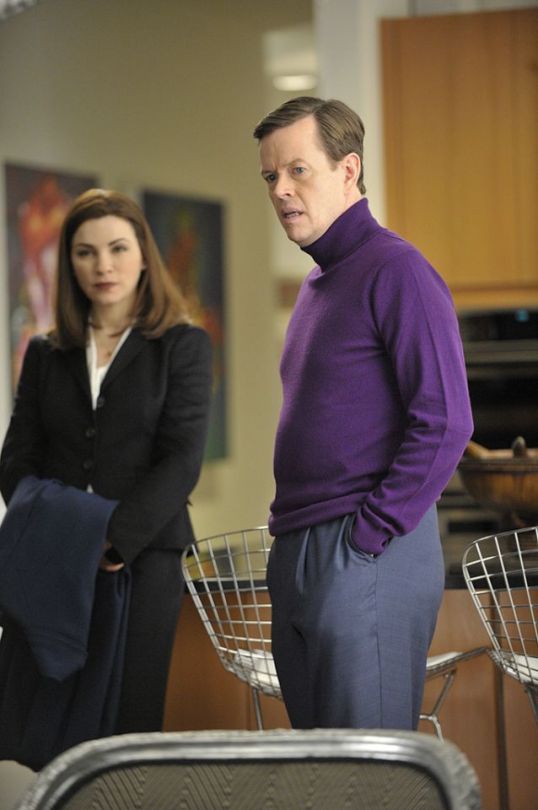
Dylan Baker has earned three Emmy nominations for playing Colin Sweeney, an accused wife killer who first appeared in Season 1′s thirteenth episode, “Bad,” and returned often enough to be dubbed Alicia’s creepiest client (“I like you, Mrs. Florrick,” he once told her. “You feed my Mary Poppins obsession”). When the audience knows a recurring character well enough to find a cutaway shot to him scowling in a courtroom funny, you’ve done your job. (Credit: John Paul Filo/CBS)
2. They created a role worthy of Michael J. Fox.
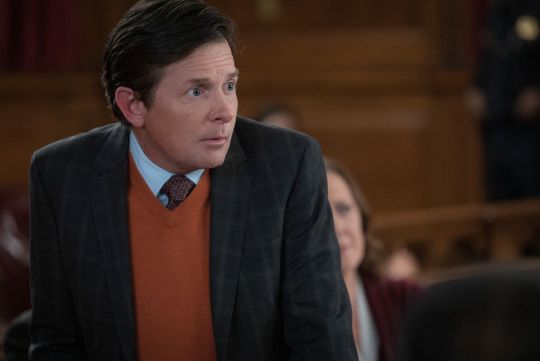
How do you make opposing lawyers quickly feel like three-dimensional characters? You have them exploit whatever they can about themselves in the courtroom. For Fox’s Louis Canning, that’s his illness (cue the eyeroll from Alicia). Over the years, as Fox has earned four Emmy nominations for the role he first played in Season 2, we’ve seen many sides of Canning (and even his alleged deathbed). But like all great recurring characters, he continues to bring out the best — and worst — in Alicia, including that awesome fake cry Julianna Margulies performed in the series’ penultimate episode when Alicia imagined what Canning expected to see when he told her Peter was accused of having a longtime affair. (Credit: Michael Parmelee/CBS)
3. They acknowledged that judges have personalities and personal views — and how they remain fair (unless they’re being bribed or just want to move their day along, of course).
On most shows that take us inside the courtroom, you don’t even know the judge’s name, let alone that she prefers you always use the phrase “in my opinion” (Ana Gasteyer’s Judge Patrice Lessner) or his position on gun control (Denis O’Hare’s Charles Abernathy). Because they’re truly characters, we can find them punishing the lawyers either amusing (David Paymer’s Judge Richard Cuesta keeping score in Peter’s current trial) or infuriating (pretty much every interaction Christopher McDonald’s Judge Don Schakowsky has ever had with Alicia). (Credit: Craig Blankenhorn/CBS)
4. They recognized another truth: Just because you have young kids doesn’t mean you’re soft.
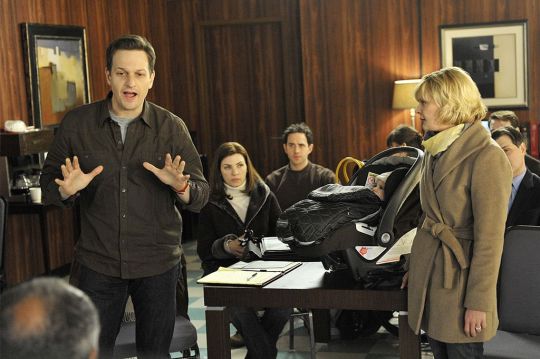
It turns out you can still be fierce (Martha Plimpton’s Emmy-winning role, attorney Patti Nyholm) and extremely competent (Tim Guinee’s Mr. Mom investigator, Wiley) even when you have to bring your baby to an emergency hearing or take a call from the State’s Attorney through a talking lion toy. (Credit: John Paul Filo/CBS)
5. They weren’t afraid to go quirky. Like really, really quirky.
You can also be as eccentric as attorney Elsbeth Tascioni (Emmy winner Carrie Preston) and extremely respected. She carries ridiculously large bags and has made some ridiculous entrances, but her brilliance is never questioned (even after she’s busted singing along to “Call My Maybe” while falling for Kyle MacLachlan’s Josh Perotti). (Credit: Jeff Neumann/CBS)
6. They wouldn’t let you judge a book by its cover.
Nancy Crozier (Mamie Gummer) was one of Alicia’s greatest adversaries. Young, bright, and deceptively naive, she was actually a cobra whose bite made even the audience sit up a little higher in their chairs.
7. They knew a face you would want to slap — but wouldn’t want to stop watching.
State’s Attorney Glenn Childs (Titus Welliver) was the original foe we loved to hate. His legacy has lived on, though, in that office, in the high-ranking members of the Democratic party who’ve screwed Alicia and Diane, and most recently, in AUSA Connor Fox (Matthew Morrison), who’s taking the last crack at Peter.
8. They knew opposites attract.
Christine Baranski’s Diane didn’t need a man in her life to be a great character, but we’re sure glad she found Kurt McVeigh, Gary Cole’s ballistics expert. Their flirtatious cross-aisle verbal sparring grew into a still passionate relationship befitting a man who’s willing to sacrifice his most valuable commodity — his word — for the love of his life, and a woman who means it when she vows to make him happy every day of his life if he’ll forgive her. If we were told only one romance could survive the finale — Diane’s or Alicia’s — we’d pick this one.
9. They knew people with opposing views could be civil.
It was fascinating to see R.D. (Oliver Platt), an approachable and politically conservative businessman who loved a civilized argument with a worthy opponent, in scenes with Diane. He respected her, and used her as the devil’s advocate — eventually making her question whether his retainer was worth the sale of her soul.
10. They knew how to keep us guessing.
Were we supposed to like David Hyde Pierce’s Frank Prady, a political commentator-turned-State’s Attorney candidate who insisted to opponent Alicia that he wanted to run a campaign? We wanted to trust him (he’s played by David Hyde Pierce after all), but in the world of ‘Good Wife’ politics, you could never be sure.
11. They knew how to make feminists think.
Caitlin (Anna Camp) was a promising young lawyer who wanted to leave her burgeoning career to focus on her fiancée and their planned family. For some viewers, that’s as divisive a decision as Alicia standing by Peter at the start of the series. Alicia tried to talk Caitlin out of it — you can have it all — but Caitlin said she wasn’t sacrificing anything; she was choosing what she wanted. Her generation has nothing to prove, Caitlin said. Of course, years later we learned that Caitlin is now a single mom, back at work, and wondering if she ever should have left. Is the moral that nothing can guarantee a happily ever after, or that she’ll be fine, just like Alicia was?
12. They introduced us to Mike Colter.
Though he came to the show with credits, it’s his portrayal of the stoic, imposing Lemond Bishop that was Colter’s big break. “Mike Colter is such an amazing actor, and everybody’s catching on now and stealing him from us, which we take as a personal affront,” ‘Good Wife’ co-creator Robert King joked to Yahoo TV last year. (Colter’s ‘Jessica Jones’ character, Luke Cage, get his own Marvel series debuting Sept. 30 on Netflix.) “While this guy can play the very grim drug kingpin, it’s always fun to see how there’s a real human side underneath that because he’s a dad. Being a dad myself, I shovel some of my issues into [Bishop]. It’s just like you got a guy who’s split right down the middle. And obviously, Kalinda’s got front row seats for that.”
13. They made us wish Matthew Perry could have stuck around.
The actor’s slap-me dry delivery was way more palatable as Mike Kresteva, Peter’s political rival, than it is as Oscar on The Odd Couple. Damn you, Go On!
14. They took advantage of filming in NYC.
New York is not just the home of Law & Order franchise guest stars, it’s the home of Broadway stars, and many have had memorable turns on The Good Wife, including Renée Elise Goldsberry (ASA Geneva Pine), who just received a Tony nomination for her role in Hamilton, and Laura Benanti (Sweeney’s latest wife, Renata), who just earned her fifth career Tony nomination for She Loves Me.
15. They wrote sexy, accomplished women over 40.
On a show with Alicia and Diane, you’d expect nothing less, but let’s appreciate the juicy roles for women such as Rita Wilson (Diane’s old attorney friend Viola Walsh) and Vanessa Williams (the businesswoman/donor who broke Eli’s heart).
16. They built a believable family.
We all know where Alicia gets her love of wine — from her mother, Veronica (Stockard Channing) — and why she turned out okay (she had her brother, Owen, played by Dallas Roberts, to commiserate with). It was nice to see them return recently when, for at least a moment, there was a lightness to Alicia that matched theirs.
17. They gave us a millennial we didn’t hate!
Another welcome return: Eli’s daughter, Marissa, who is the only person we like to see outwit Eli and is second only to Gary on ‘Veep’ when it comes to our favorite body man (or woman). We still wish she was working for Alicia.
18. They always found new and different foils for Eli (Alan Cumming).
Eli was always at his best when he was maneuvering against someone. It didn’t matter whether it was a savvy teen mean girl (Dreama Walker’s wicked Becca), Peter’s manipulative mother (Mary Beth Peil’s delicious Jackie Florrick), or a more accomplished peer (Margo Martindale’s imposing Ruth Eastman).
19. They made us fall in love again.
After the shocking death of Will Gardner (Josh Charles), much of the audience, like Alicia, felt hollow. But Matthew Goode’s Finn Polmar, the ASA who’d been opposite Will when he was shot dead in court, filled us up again with a simmering promise of sexual tension. Even though Goode was ultimately billed as a series regular, you sensed he was just passing through (on his way to Downton Abbey). He left because he knew he couldn’t work closely with Alicia and not have things get “sloppy” between them. He left us wanting more (i.e. Jeffrey Dean Morgan’s Jason).
20. They weren’t ageist, really.
Could it be the series’ happiest ending is reserved for Jackie and nap-loving firm relic Howard Lyman (Jerry Adler)?
21. They went with the unexpected.
Who wasn’t surprised to see Linda Lavin as Joy Grubick, Cary’s pretrial services officer? She was by the book, but even when she wouldn’t cut him a break for going half a mile over the state line, there was something calming in her slow-talking voice that made it difficult to get angry with her.
22. They warmed our hearts.
Clarke Hayden (played by Nathan Lane, who was nominated for an Emmy for his guest turn) was a court-appointed trustee whose job was to trim the fat at Lockhart/Gardner. He eventually grew close to Cary (Matt Czuchry) — who, in the backstory Lane created for the character in his own mind, reminded Clarke of his son who’d died of an overdose — and got to put David Lee (Zach Grenier) in his place. With the rat race tearing so many characters down, it’s nice to see the firm build someone up.
23. They created their own version of Snowden.
Some people loved the NSA story arc, some people thought it dragged on a bit too long, but everyone can agree how fun it was to see Silicon Valley’s Zach Woods recur as Jeff Dellinger. And let’s not forget about his former cubemates, led by Ugly Betty’s Michael Urie.
24. They even knew how to cast the right dog.
Just when you thought you’d seen every quirk on ‘The Good Wife,’ we were introduced to Elsbeth’s ex-husband, Mike Tascioni (Will Patton), who shares custody of their absurdly chill Chihuahua mix (played by a one-and-a-half-year-old rescue dog named Louie). “We’ve been interested in the idea of emotional support dogs, and it made sense to us, as we built the Mike character, that he might benefit from one,” ‘Good Wife’ executive producer Craig Turk told Yahoo TV. “Then it felt like high-strung Elsbeth might benefit, too. And if you begin to imagine what the dog in that situation would feel like… you get Tom. I named him Tom because, when writing the Mike character for the first time, I described him as hero-worshipping Atticus Finch — so, the ‘To Kill a Mockingbird’ connection.”
25. And finally, on the rare occasion they made a misstep, the role (read: Kalinda’s ex) was cast with someone who’d make it easy to forget.
Sorry, Marc Warren.
https://www.yahoo.com/tv/25-reasons-good-wife-had-223854699/photo-5-they-weren-t-afraid-to-1462401610717.html
6 notes
·
View notes
Text
Learning the Loathed
When we learn something and decide that we despise it, we will stop learning about it and every other thing associated with it.
Instead, we will avoid it as best as we can to keep us away from the feeling of irritation that might occur.
I have a belief that basically, everything we despise or we hate are just things we failed to understand.
In last semester break, I conducted a personal project. The goal of this project is to challenge that belief I had and to reconsider the reasons of despising particular things (whether it is justifiable).
First thing I did was making a list of several things I hate. Then, I tried to approach them and interacted with them as if I had never knew them before. Yes, instead of avoiding those things I hate, I studied them. Turned out the results are vary. Some things are just not meant for me to like or to understand. The more I study them, the more I hate them LOL (I posted one of them a couple weeks ago).
But I also experienced a lot of perspective changes toward particular things I studied. One of them is children. Yes, I'd been annoyed by their existence since... I am not sure when.
I have a little sister. She's only five and she's less irritating than most kids. But still, she's just like any other healthy kids growing.

She's inquisitive, playful, and sometimes brash. She is also colorfully dressed (like she's about to attend a costume party and dressed as a traffic light). She's unable to be silent and sit still more than a minute.

She wails when mother and father left, she wipes her mucus with her t-shirt, and she practices pillates a lot (and other extreme sports??!)

I spent a lot of time with her for approximately two weeks to study her world (exhausting days!). It was hard at first because I am not used to handle kids. I approached her; I asked her out, I bought her ice cream, I read her books, I told her about science and how the world works and I taught her a lot of things like counting, painting, reading, taking pictures, etc. I did it all in the most interesting way I could think of for children. (But no, I didn't feed her, dressed her, bathed her nor wiped her ass. Thanks). I spent almost half a day with her daily. At first it was hard and exhausting as hell I almost give up but day by day things got easier.


Besides observing my sister's behaviour and natural traits through her dialy activities, I also learned how children see the world by reading children books and movies. I watched Tayo the friendly little bus, frozen, baby shark dudududu, teletubbies, pororo, etc.

I also recalled my childhood memories by seeing photographs, watching movies, reading stories and listening songs I like when I was my sister's age.

But the most significant effort I did to study children is reading classic works with children as the characters. The chosen author was Frances Hodgson Burnett. I chose her because one of her works, A Little Princess, was the first high literary work that I read when I was in elementary school (which in the end made me fall in love with reading and literature).


I read her other works, The Secret Garden and Little Lord Fauntleroy. Those two works has sucesfully elightened me and made me come to higher understanding about children in a very unexpected ways. After reading those works, I came to the understanding that children see, think and feel too. I've been able to learn their natural traits through the depiction in the story.

Well, doing those things certainly drained me but I it was surely worth it as I learned a lot in the process. I gained new perspectives about children and in the end I understand more about life and how it works.
But the most important part is..... at last, I am not as irritated with children as I was! (But still, they are irritating anyway). I have been able to control my temper and mood around them as I understand them as well as their world better.
0 notes
Text
Fitness Blog Ideas: 10 Proven Ways to Win More Readers
A fitness blogger doesn’t have the luxury of writer’s block. When writing isn’t even your primary gig, you need to get your post done and get back to your day job. But that assumes you already have an idea for your fitness blog post teed up. And too often, that’s not the case.
Or so you think. If you’re in the business of solving problems for your clients, you already have all the fitness blog ideas you need. Same with the problems you solve for yourself. In fact, your entire life is wired to generate topics for blog posts. You just need to figure out what to do with them.
READ ALSO: How to Start a Fitness Blog: The Ultimate Guide
These 10 techniques will help you tease out your ideas, refine them, and prep them for prime time.
1. Turn your problems into lessons
2. Show what the world looks like through your eyes
3. Explain what that controversial new study really shows
4. Be the contrarian
5. Make a prediction
6. “Cut me, Mick!”
7. Plot twist!
8. Mine your data
9. Think about the future
10. Feed your head
Make sure you record each new idea somewhere—a notebook, a voice memo, or a text or email to yourself. Consolidate them in one place so they’re at your fingertips when you sit down to write. Then all you need to do is choose your own adventure.
1. Turn your problems into lessons
What do you deal with that might enhance your credibility with your readers? Maybe you struggled with your weight for much of your youth. How do you work around those football or basketball injuries in your own workouts? What could you do five or 10 years ago that you can’t do anymore because it leaves you with lasting pain?
Revealing how you deal with your issues can make you relatable to your audience without conceding any of your authority or expertise.
READ ALSO: Want to Write a Successful Fitness Blog? Start by Mastering This
2. Show what the world looks like through your eyes
The world is a weird and wonderful and disturbing place, sometimes all at once. But because of who you are and what you do, those unexpected moments and random conversations look and sound different.
Like when that barista lectured you about GMOs, right after you’d read an article debunking all the conspiracy theories she mentioned. Or just this morning, in the doctor’s waiting room, when you eavesdropped on two very confused people extolling the wonders of the latest fad diet.
As long as you can segue from a strange or funny anecdote into something relevant to your audience, your content practically writes itself.
3. Explain what that controversial new study really shows
The hot take can be risky. But if you’re willing to put your opinion or analysis out there on a news-related subject that’s relevant to readers, you can generate lots of interest and interaction. Especially if you like to …
4. Be the contrarian
Find the super-popular subject in your industry that bothers you and take it on. One rule: You’d better know your stuff. Anything less than an expertly reasoned argument and you’ll get blasted for trolling, clickbaiting, or, worse, not knowing what the hell you’re talking about. That said, anything about a celebrity’s diet is sure to please.
5. Make a prediction
Take a subject in your wheelhouse and predict the future. Where will we/it be in one, three, five years? Once you reach the far side of your time frame, you’ll have a ready-to-write story about how wrong you were.
6. “Cut me, Mick!”
Pop-culture touchstones like Stallone, or Arnold, or anyone who played an Avenger, give you quick and easy connections to readers. Any image or quote your audience recognizes can work as a springboard to a topic that relates to it in some way.
It could be something a character does that violates the basic principles of strength and conditioning (like when the Karate Kid develops lightning-fast reflexes … by slowly and tediously waxing a car). Or something an actor says in an interview that illustrates why Hollywood transformations are nothing like the challenges faced by your clients, who don’t have personal chefs and can’t train for five hours a day.
7. Plot twist!
“Luke, I’m your father.” “Dead people don’t know they’re dead.” “The Lannisters send their regards.” Each of those famous plot twists made you rethink everything you thought you understood about the story you’d been following.
Why should screenwriters have all the fun? There’s no reason why a fitness blog post can’t upend your readers’ expectations.
Pick an evergreen nutrition or fitness topic, one your audience assumes you have a conventional opinion about. Then give them something they didn’t see coming. What do you do that goes against current practice? What’s something everyone supports that you think is overrated, or perhaps even dangerous?
READ ALSO: Fitness Blog Post Titles: 7 Rules for Making Your Headlines Irresistible
8. Mine your data
What do your website analytics tell you about the subjects of your posts? Are there some that consistently get more clicks, shares, or comments, or keep people on your pages longer? What are the most common search terms that bring new visitors to your site?
This data is exclusive to your audience, and gives you clues about which topics are more or less likely to be popular. You can also mine the questions people ask you, or what your followers respond to on your social media.
Or you can get your followers to write content for you. A basic Twitter poll about “worst gym habits” or “dumbest exercise people still do” can generate comments you later share in a blog post or newsletter.
9. Think about the future
What will people be talking about in the next few days, weeks, or months? Where’s the fitness or nutrition angle? Whether it’s a Super Bowl, Star Wars movie, or presidential election, you can practice what the PR pros call “newsjacking” by using a high-profile event to your own advantage.
10. Feed your head
Think of a busy intersection, and all the moments of interaction every time you pass through—quick eye contact with another driver, a wave to someone who gives you the right of way when she doesn’t have to, an angry beep at someone who didn’t let you through even when he was supposed to. You could drive through this intersection three times a day and never have the same experience twice.
That’s what creativity is: an infinite variety of ideas and mental cues intersecting in your gray cells, each connected to other ideas or cues. Most are random and instantly forgotten, but they don’t need to be. You can train your brain to find and hold on to those connections, and to build them into ideas you can use in your fitness blog posts.
How? Read. Listen. Google things you’ve always been curious about, inside or outside your scope of practice, and then fall down rabbit holes. Your goal is to prime your subconscious mind to tee up ideas for you. And it will. A well-trafficked brain will find ideas in your dreams, in random sentences in books, in the way someone in your gym talks about a thing that reminds you of another thing that you happen to know something about.
Build those intersections, and let the content flow.
A version of this article first appeared in the December 2018 issue of Fitness Marketing Monthly.
The post Fitness Blog Ideas: 10 Proven Ways to Win More Readers appeared first on The PTDC.
Fitness Blog Ideas: 10 Proven Ways to Win More Readers published first on https://onezeroonesarms.tumblr.com/
0 notes